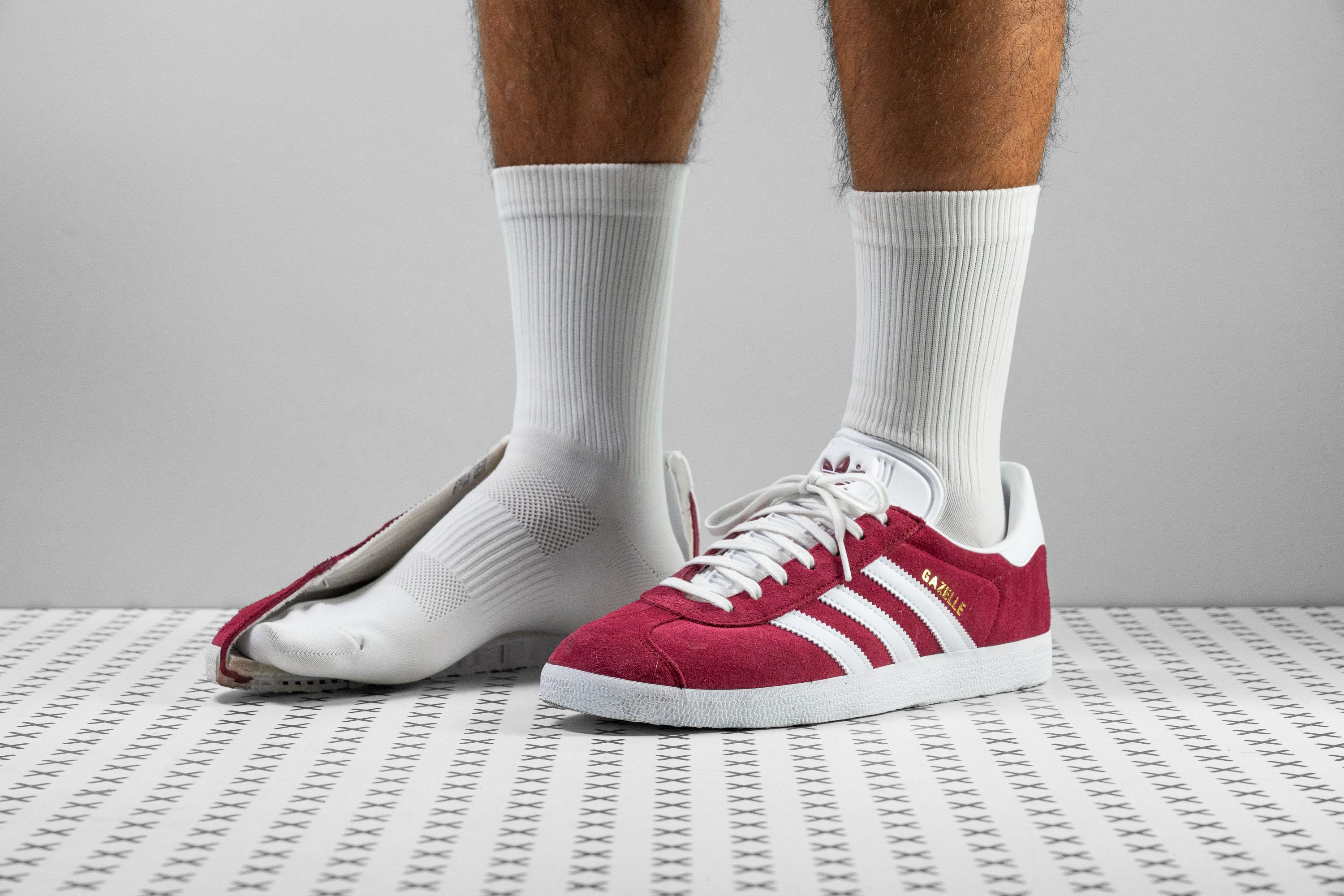Our verdict
- Top pick in best classic Adidas sneakers
- Top pick in best Adidas sneakers
Pros
- Timeless elegant look
- Excellent value for money
- Real suede
- More than 20 colorways
- Promising durability
- Flexible design
- Supportive foothold
Cons
- Poor breathability
- Tongue is rough and squeaks
- Not for all-day wear
Audience verdict
- Top 10% in sneakers
- Top 14% in suede sneakers
- Top 20% most popular sneakers
Comparison
The most similar sneakers compared
+ + Add a shoe | |||||
|---|---|---|---|---|---|
| Audience score | 94 Superb! | 91 Great! | 94 Superb! | 93 Great! | |
| Price | $100 | $90 | $100 | $90 | |
| Style | Business casualClassicSportyMinimalist | Business casualClassicRetroSportyMinimalist | Business casualClassicSportyMinimalist | ClassicSportyMinimalist | |
| Shock absorption | Low | Low | Low | Moderate | |
| Energy return | Moderate | High | Moderate | Moderate | |
| Traction | Moderate | Moderate | Low | High | |
| Breathability | Moderate | Moderate | Warm | Moderate | |
| Weight lab | 13 oz / 369g | 12.1 oz / 342g | 11.8 oz / 335g | 14.1 oz / 401g | |
| Size | Slightly large | True to size | True to size | Half size large | |
| Material | Suede | LeatherSuede | Cup SoleGum SoleLeatherSuede | Cup SoleLeather | |
| Season | SpringFall | SpringFall | SpringFall | SpringFall | |
| Inspired from | Training | Soccer | Soccer | Basketball | |
| Width / fit | Medium | Medium | Medium | Medium | |
| Toebox width | Medium | Medium | Narrow | Narrow | |
| Leather/suede quality | Real suede | Real suede | Real leather | Real leather | |
| Toebox durability | Good | Decent | Good | Good | |
| Heel padding durability | Decent | Decent | Good | Bad | |
| Outsole durability | Decent | Bad | Good | Decent | |
| Heel stack lab | 23.3 mm | 19.3 mm | 20.3 mm | 26.8 mm | |
| Stiffness | Flexible | Moderate | Flexible | Flexible | |
| Tongue padding | Thin | Thin | Thin | Average | |
| Drop lab | 8.3 mm | 7.4 mm | 8.6 mm | 13.2 mm | |
| Forefoot | 15.0 mm | 11.9 mm | 11.7 mm | 13.6 mm | |
| Removable insole | ✓ | ✓ | ✓ | ✓ | |
| Heel tab | None | None | None | None | |
| Torsional rigidity | Moderate | Flexible | Flexible | Moderate | |
| Heel counter stiffness | Moderate | Stiff | Moderate | Stiff | |
| Sustainable | ✗ | ✗ | ✓ | ✓ | |
| Closure | Laces | Laces | Laces | Laces | |
| Top | Low top | Low top | Low top | Low top | |
| Ranking | #12 Top 10% | #53 Top 44% | #15 Top 13% | #24 Top 20% | |
| Popularity | #24 Top 20% | #4 Top 4% | #36 Top 30% | #35 Top 29% |
Who should buy
There is absolutely no walking by the Adidas Gazelle if you're looking for the following:
- a timeless Adidas Originals silhouette from 1991
- an elegant sneaker made of genuine suede
- an easy-to-style model that comes in 20+ colorways
- an excellent value for money
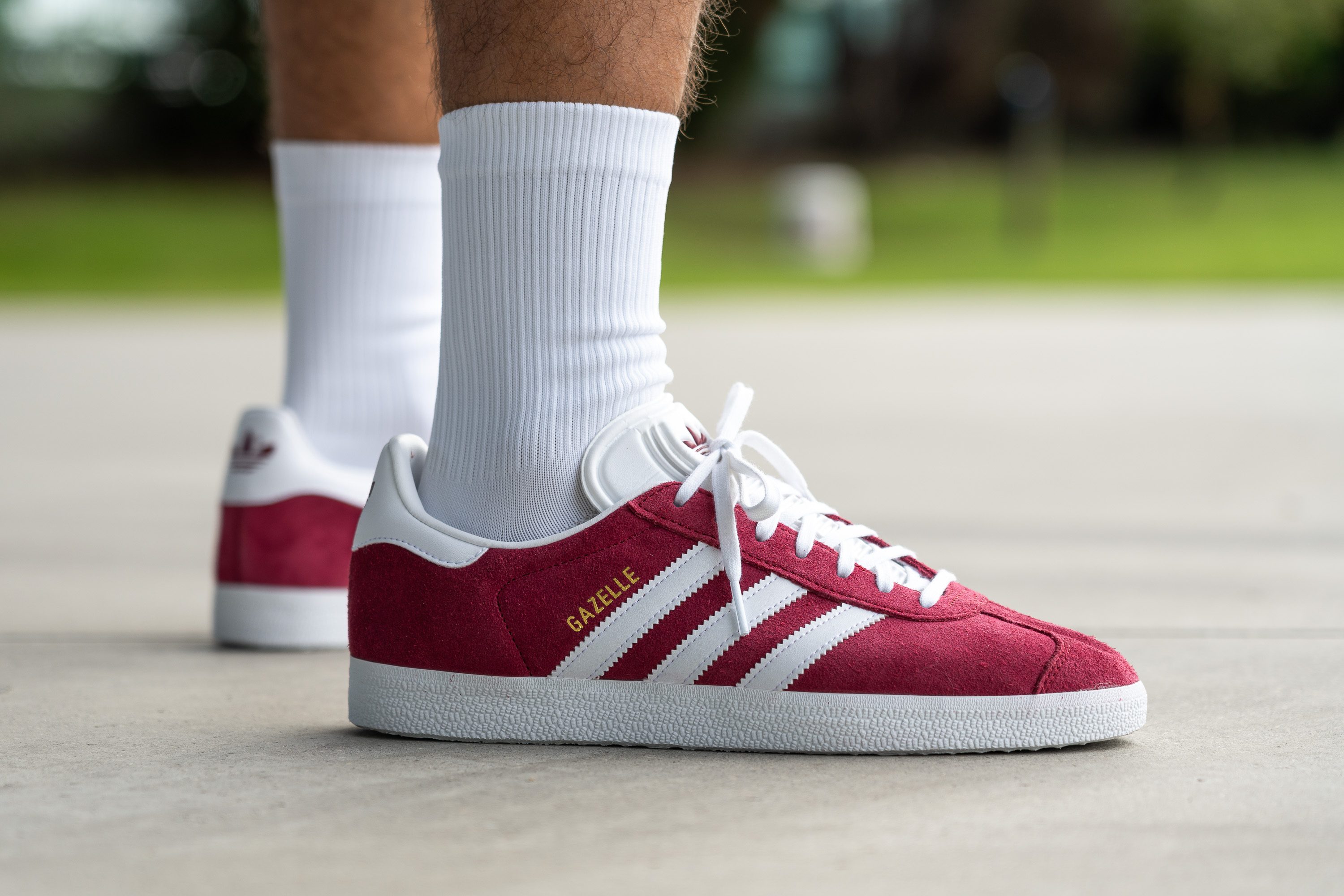
Who should NOT buy
The Gazelle's tongue can be a headache. If you want to avoid chafing and squeaking, we recommend the Adidas Superstar or the Adidas Campus 00S for their softer and better-padded tongues.
The shoe's suede upper may also feel too stuffy on a warm summer day. If you prefer fresh feet, one of our best summer sneakers is likely to suit you better.
And if you need a pair for extended periods of standing and walking, it is a better idea to get a well-cushioned Adidas shoe instead. Like the uber-comfy Alphabounce+ or the Supernova+.
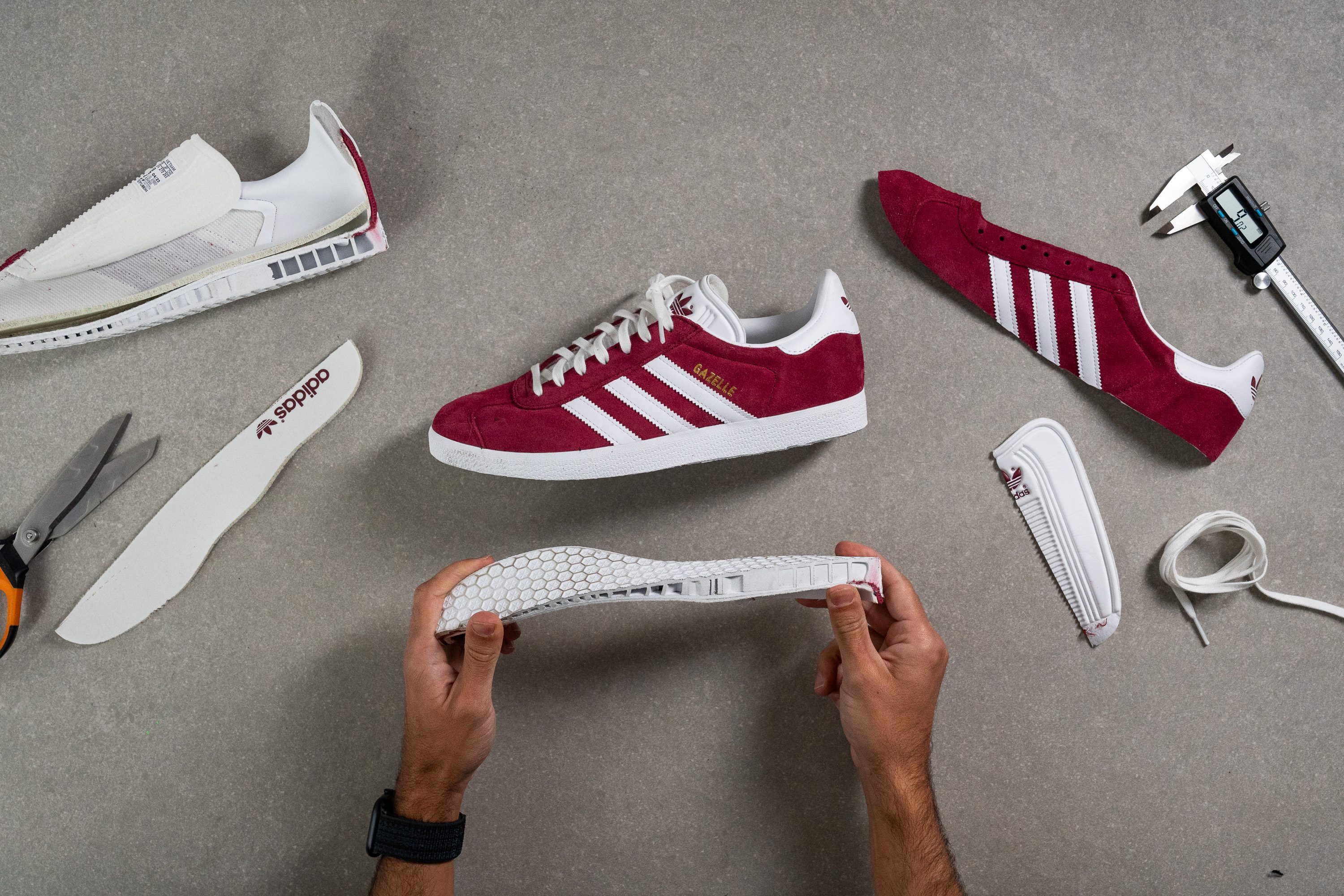
Cushioning
Shock absorption
Originally designed for indoor sports, the Gazelle was all about ground feel and precision control. These features call for a thin and minimally cushioned platform, which is exactly what you get in this Adidas sneaker.
The shoe's shock absorption clocks in at only 51 SA. The only compression you get here comes from the hollowed sections inside the midsole and the lightly padded insole.
In other words, this is a no-no for all-day wear.
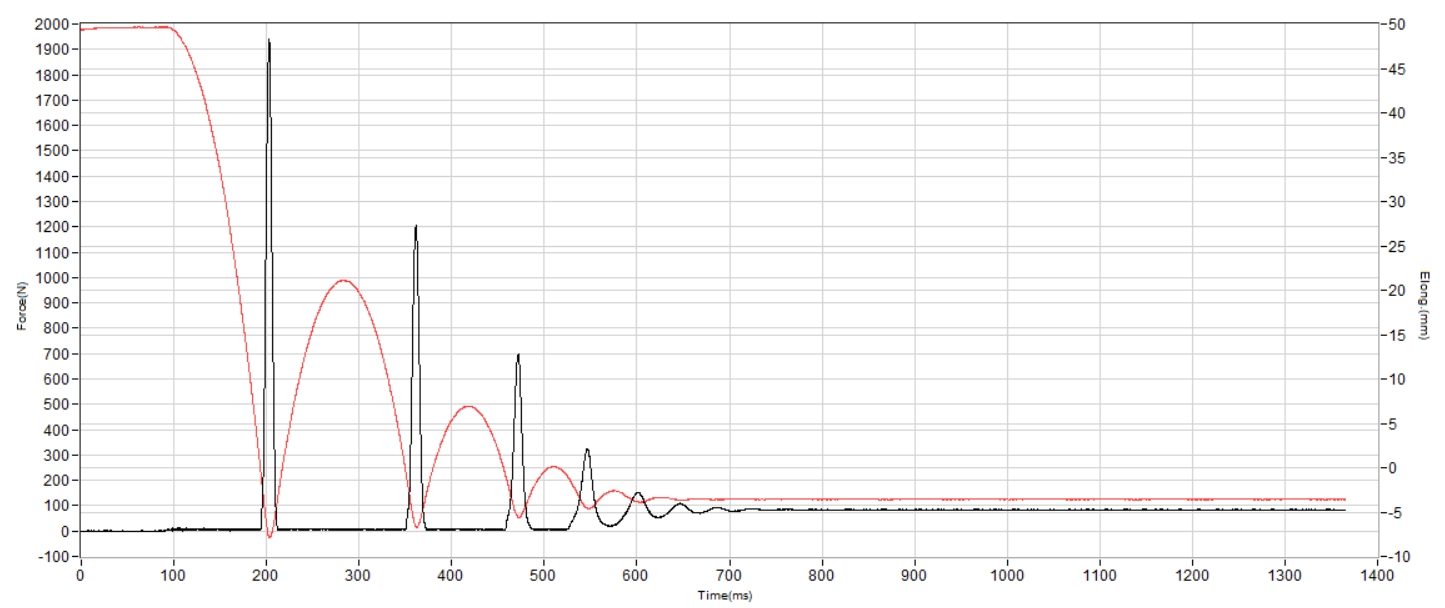
| Gazelle | 51 SA |
| Average | 89 SA |
Energy return
We also found that the Adidas Gazelle provides some essential rebound with a decent energy return of 48%. Because there is no foam to mute out the force, you get a more immediate response from a low-stack shoe like this.
| Gazelle | 48.4% |
| Average | 50.2% |
Heel stack
Much like the Samba, the Adidas Gazelle is a very grounded sneaker. But it is a few millimeters taller than its counterpart.
Using a caliper, we measured the shoe's stack height at 23.3 mm in the heel. This is notably lower than the average.
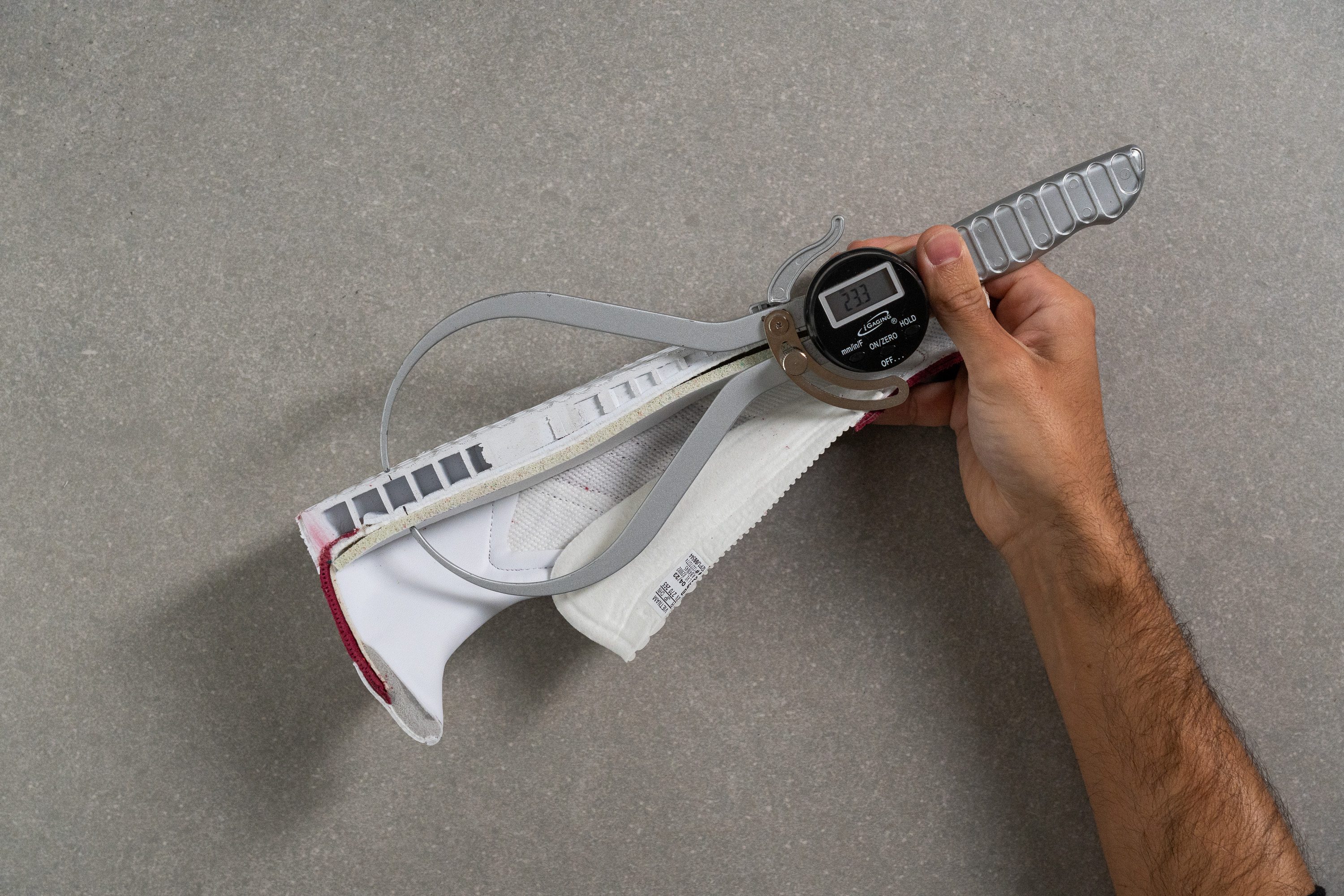
Adding to that the total absence of a cushioned midsole, we get a big no-no for all-day wear. Even though the Gazelle has a comfortable step-in feel, it really lacks underfoot support for long periods of wear.
| Gazelle | 23.3 mm |
| Average | 30.7 mm |
Forefoot stack
In the forefoot, this Adidas shoe gets even lower. According to our caliper, the stack height comes in at only 15.0 mm under the toes.
Low enough to feel the small pebbles on the ground. Watch out!
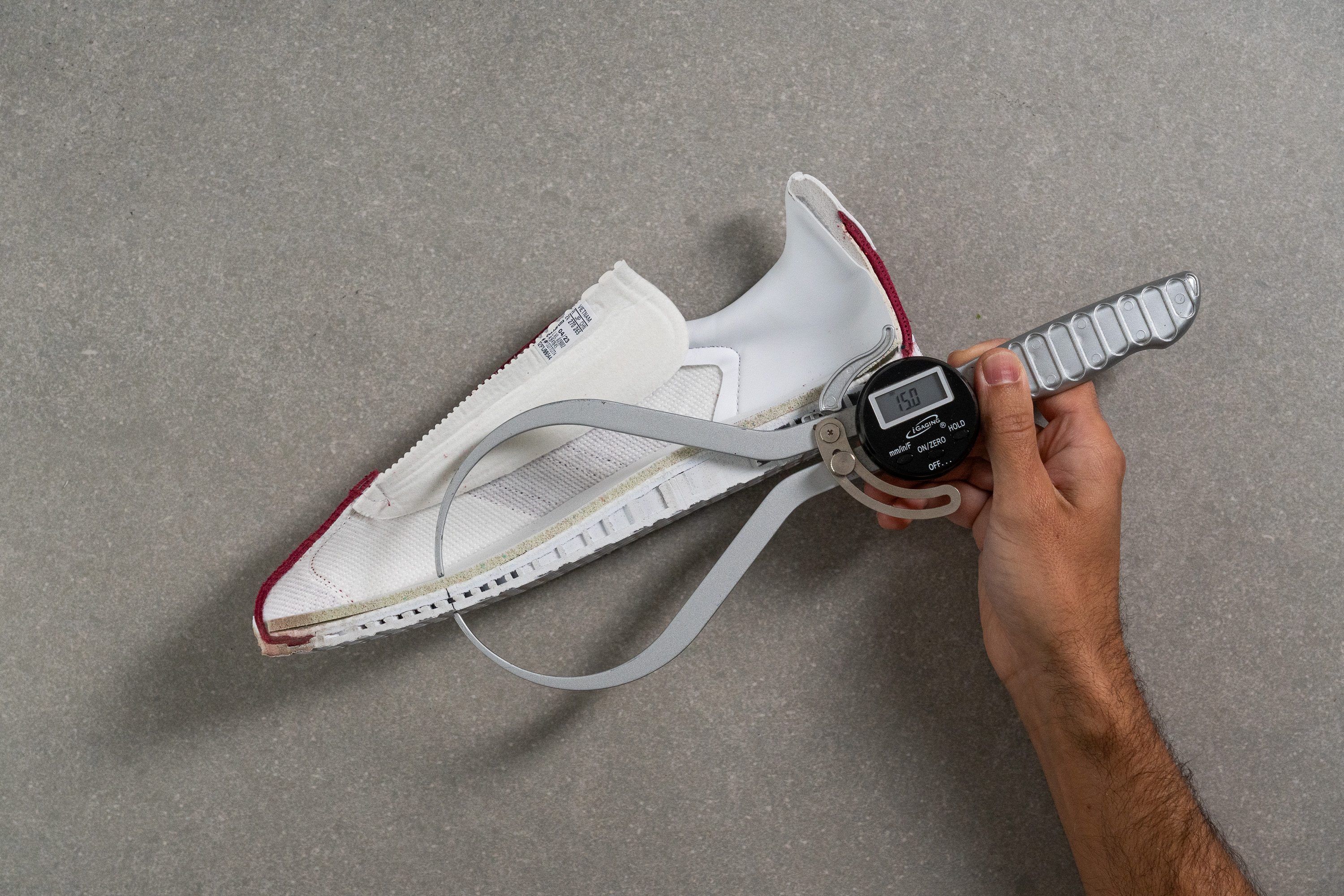
| Gazelle | 15.0 mm |
| Average | 19.5 mm |
Drop
There is not a drastic difference between the shoe's heel and forefoot stack heights. Based on our measurements, it is lower than average at 8.3 mm.
Not having an elevated heel is yet another factor that makes the Gazelle feel so minimal and down-to-earth. Whether or not that's a good thing, depends on the wearer's preference only.
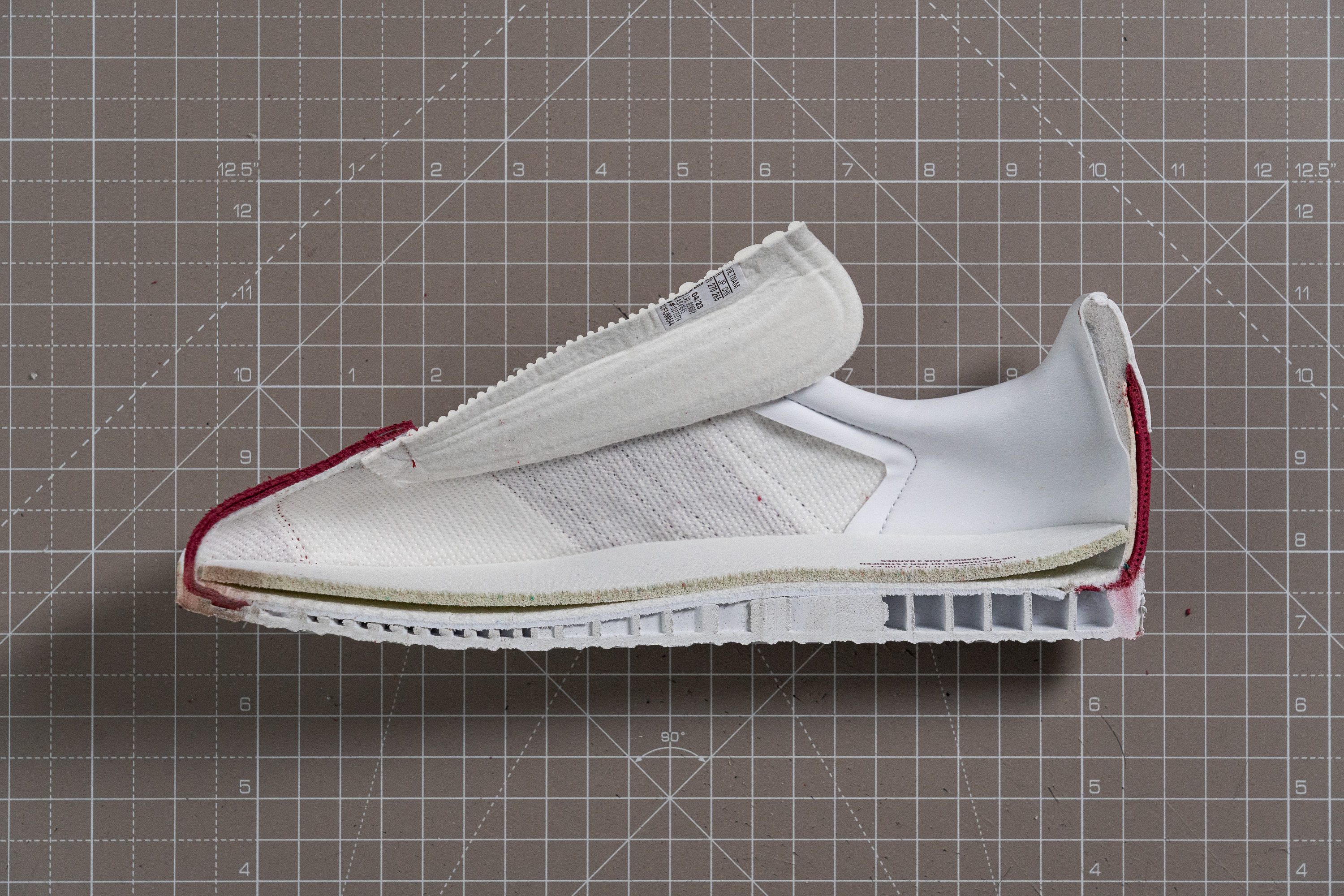
| Gazelle | 8.3 mm |
| Average | 11.2 mm |
Size and fit
Size
Adidas Gazelle fits slightly large (224 votes).
Internal length
| Gazelle | 272.4 mm |
| Average | 272.3 mm |
Width / Fit
Considering the Gazelle's slender silhouette, it is no surprise that it is a close-fitting Adidas shoe. And yet, it didn't feel constraining on our medium-width feet.
Having retrieved a gel mold of the shoe's interiors, we measured its widest area at 91.0 mm. This is not much narrower than the average and falls into the medium-width range of casual sneakers.
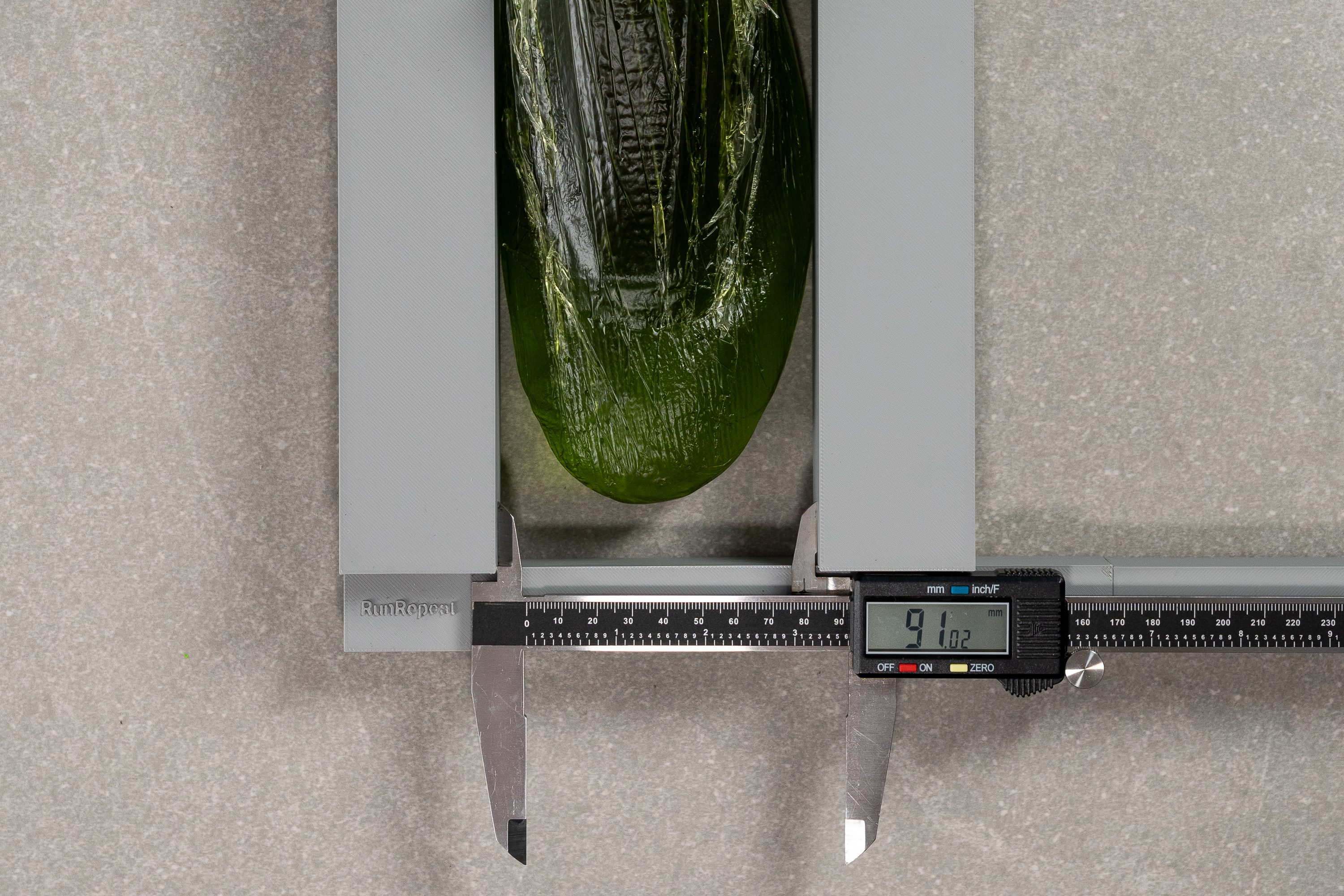
| Gazelle | 91.0 mm |
| Average | 92.5 mm |
Toebox width
At the big toe, our caliper returned a standard width of 68.9 mm. There is no aggressive toebox tapering in the Adidas gazelle which is a plus point for comfort.
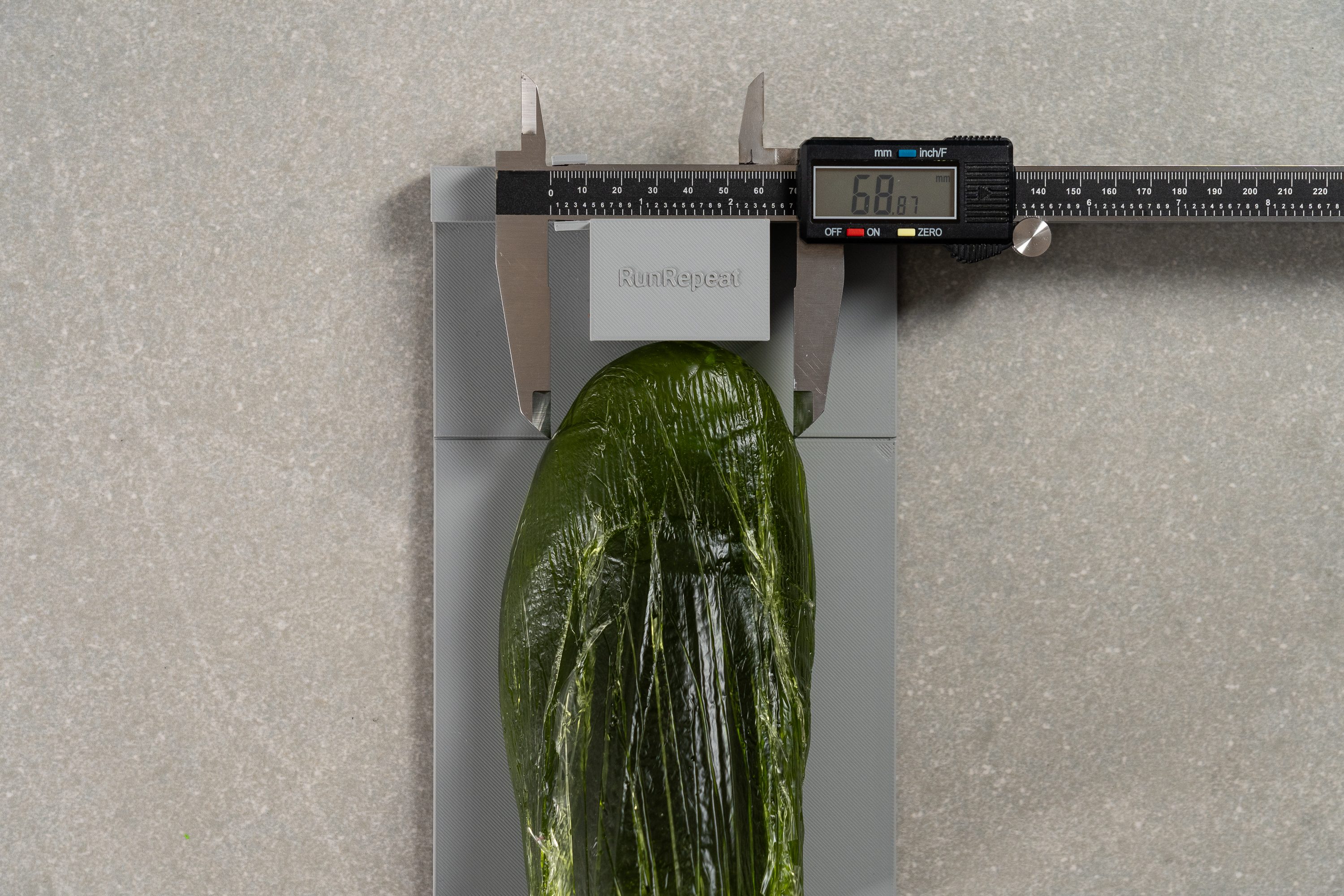
| Gazelle | 68.9 mm |
| Average | 68.9 mm |
Toebox height
Keep in mind, however, that the toebox height of the Gazelle is somewhat limited. With a vertical space of 25.0 mm, it is shallower than average.
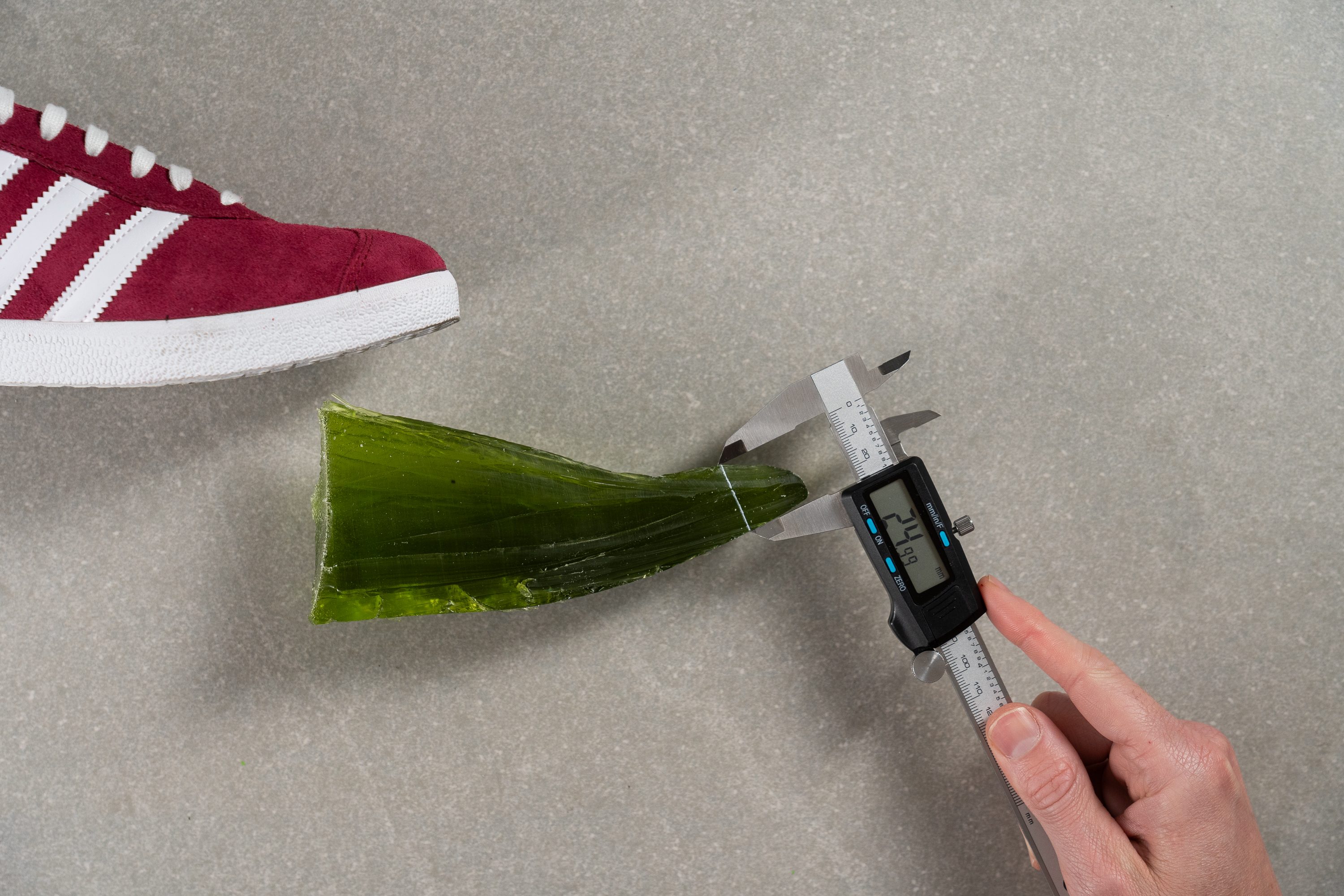
| Gazelle | 25.0 mm |
| Average | 27.8 mm |
Traction / Grip
Traction test
In this review, we are testing a regular Gazelle silhouette with a standard rubber outsole. The Gazelle Indoor, on the other hand, features a gum rubber sole which is likely to have a weaker grip.
Slashing the Gazelle against wet concrete with a 500N force and at a 7-degree angle, our grip testing machine recorded a decent friction score of 0.38. While it's not the best traction you can get in a lifestyle sneaker, it makes the Gazelle notably grippier than the gum-soles Samba OG with an even lower friction of 0.23.
However, we still recommend treading slick and smooth surfaces carefully in the Gazelle.
| Gazelle | 0.38 |
| Average | 0.43 |
Outsole design
As you can probably tell by now, the Adidas Gazelle and Samba have a lot in common. But there is one aspect where these shoes differ a lot - it's the traction pattern.
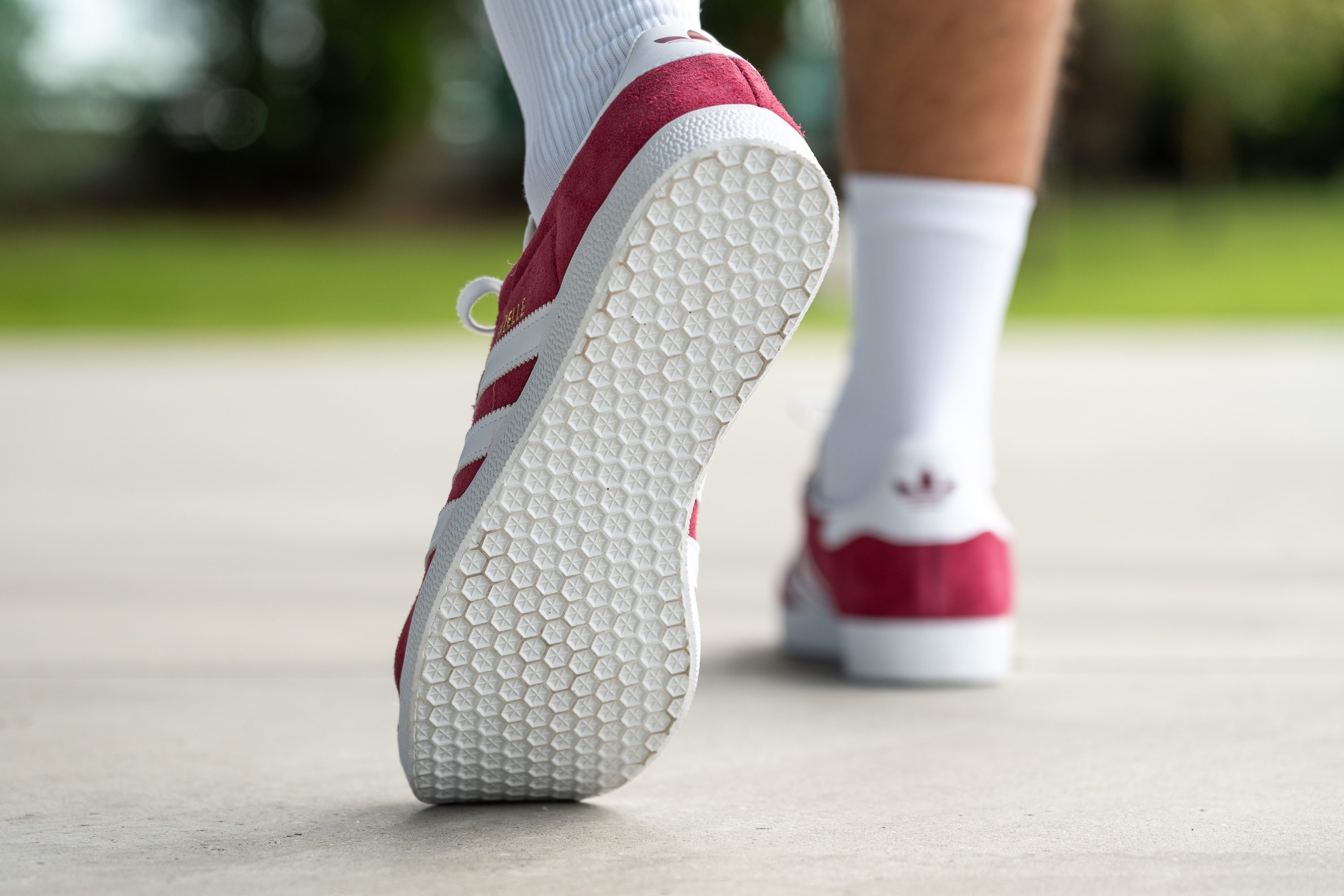
We believe that the difference is due to the initial purpose of these sneakers. The Gazelle emerged as a training/gym shoe whereas the Samba stems from soccer/football. This may explain why the latter has a much more aggressive lug design and pivot points.
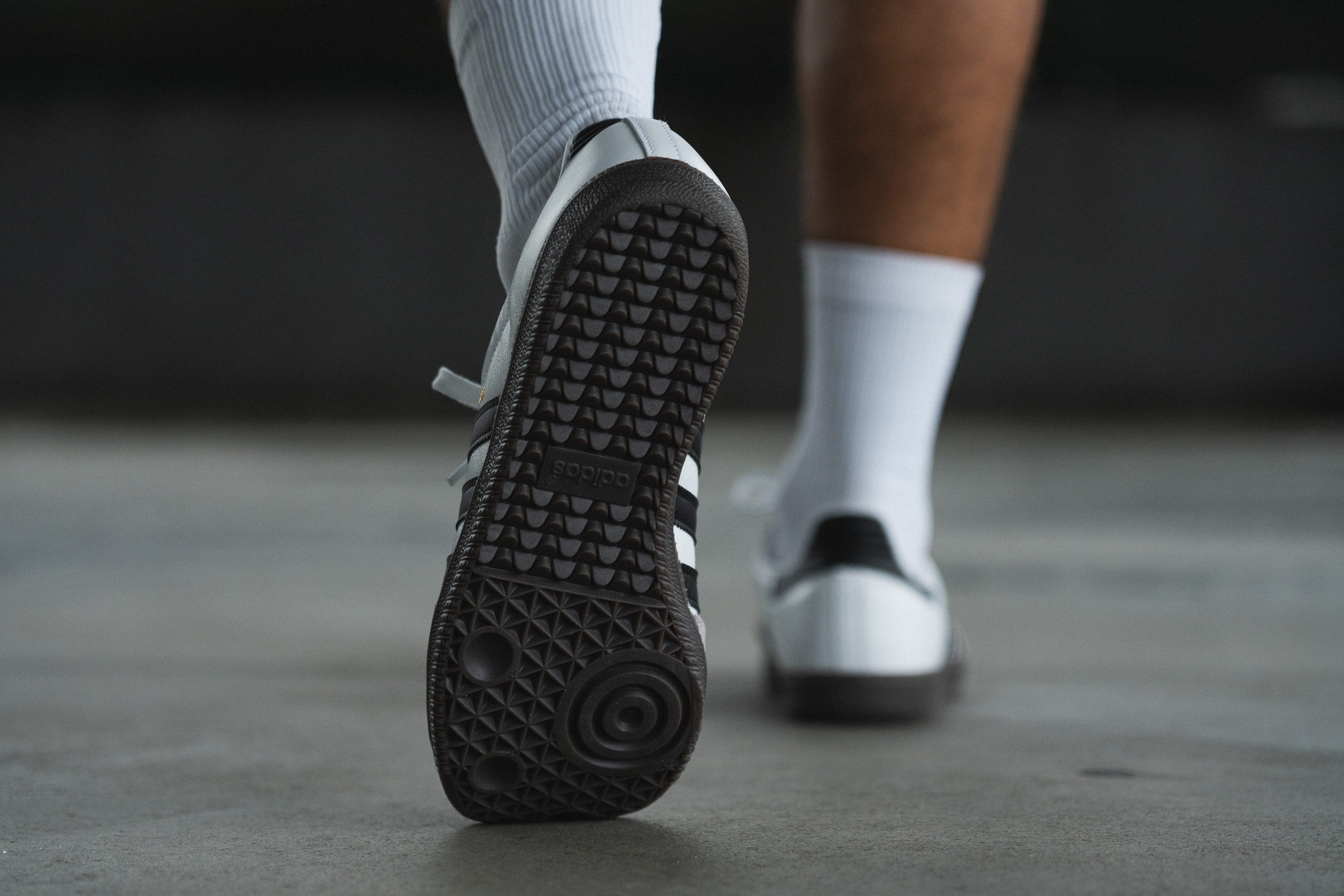
Flexibility / Stiffness
Transitioning from heels to toes feels pretty natural in the Adidas Gazelle. This is thanks to its minimal sole which bends along with the foot in a very natural way.
To give you a more precise idea of how flexible this Adidas shoe is, we used a shoe flexing tester that measured how much force it takes to bend the Gazelle to a 30-degree angle. Turns out, that it needs as little as 8.7N which is about 40% less than it takes for an average sneaker.
It is also the same amount of force as the Adidas Samba OG required.
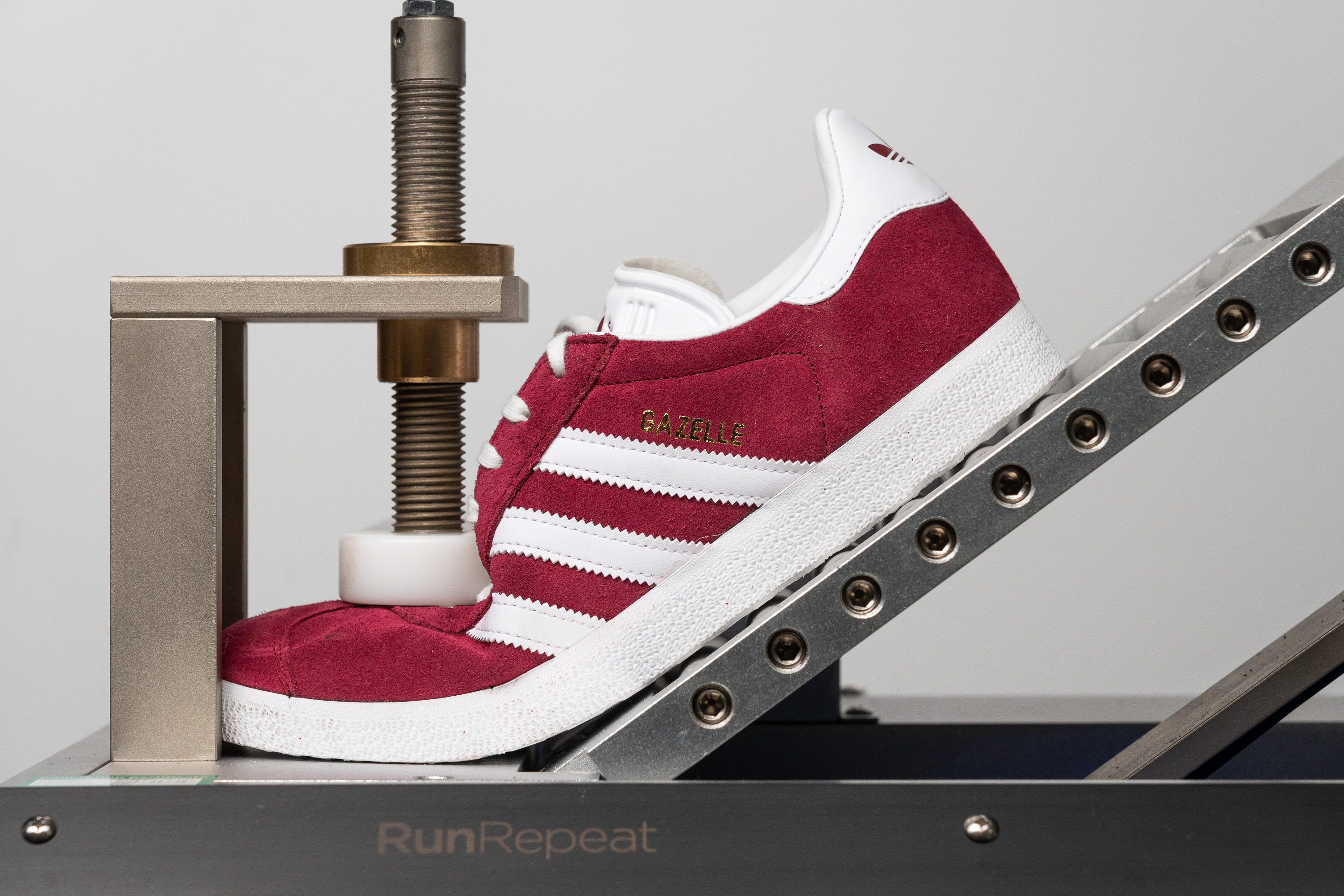
| Gazelle | 8.7N |
| Average | 13.3N |
Weight
Wearing the Adidas Gazelle for a few hours straight, we never felt like it was dragging us down. In fact, it felt on the lighter side of sneakers.
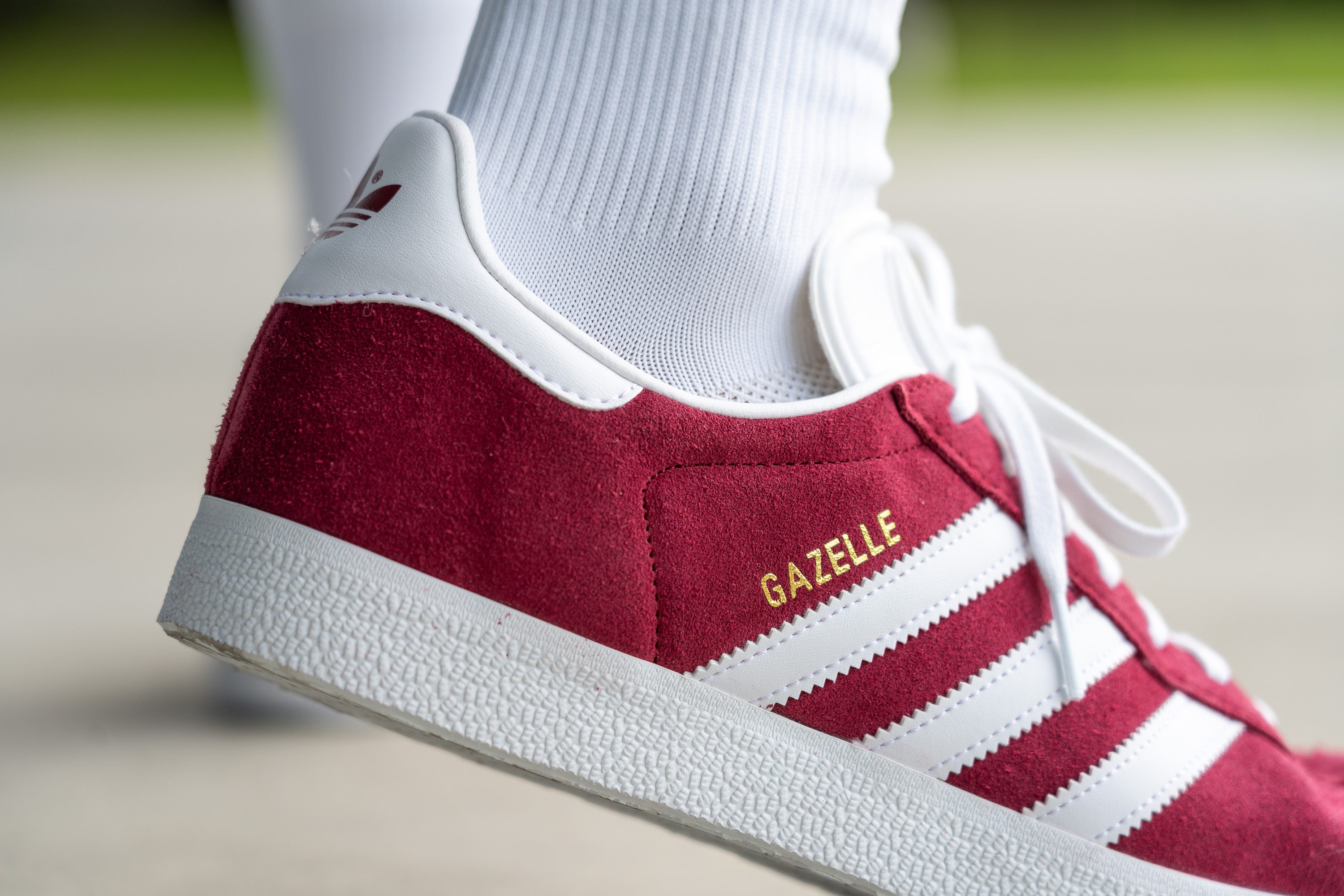
To back up our experiences, we put the shoe on the scale and found that it weighs 13 oz (369g) in a men's US size 9. For a low-top kick, this weight is right about average. Certainly not among the lightest on the market.
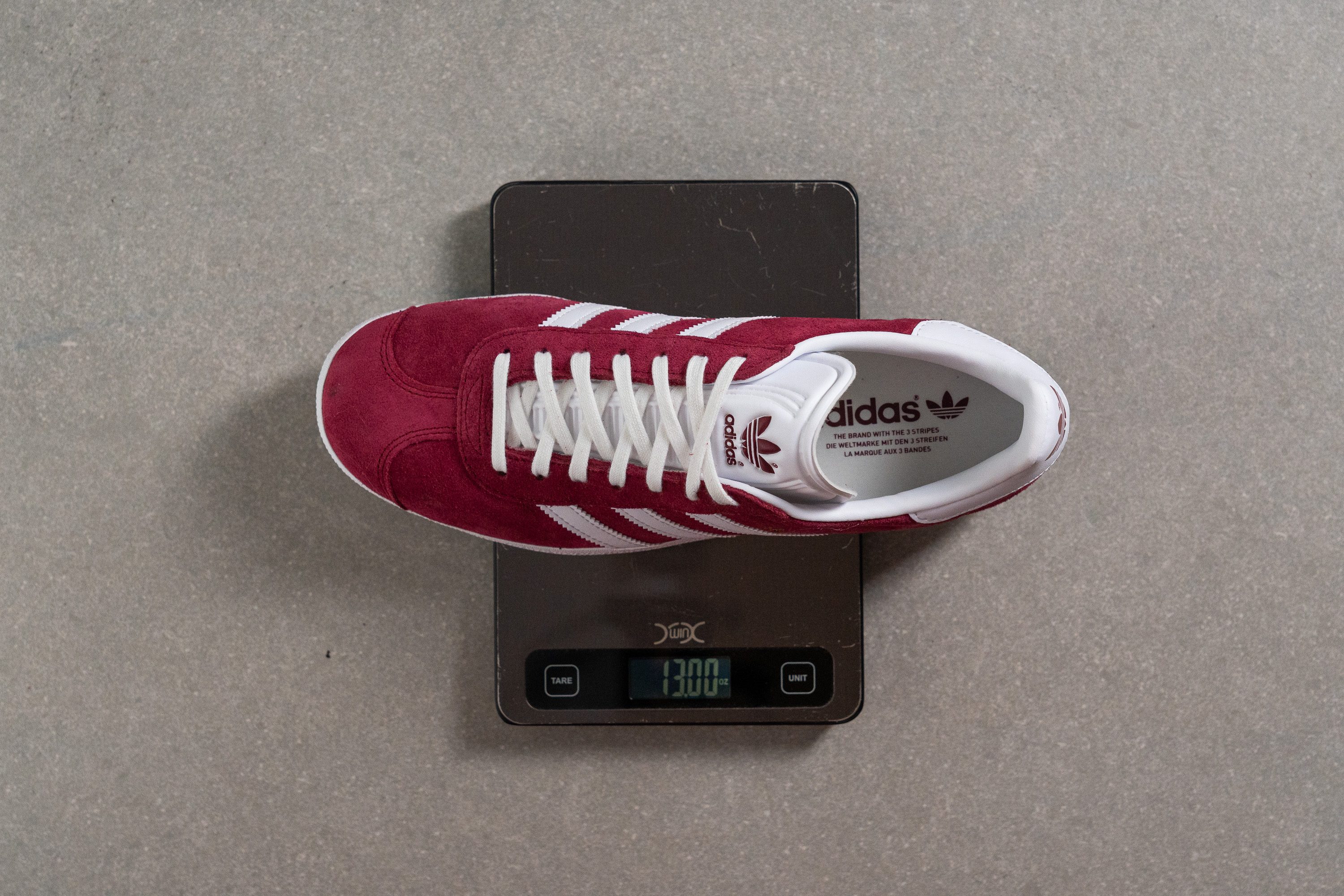
| Gazelle | 13.0 oz (369g) |
| Average | 13.8 oz (390g) |
Breathability
The vivid color options of the Gazelle scream summer. But its toasty suede upper whispers the opposite.
When we used a smoke-pumping machine to check the shoe's ventilation capacity, we found that it was not such an airy sneaker. The smoke (air) was only able to escape from the gaps on the sides of the tongue.
It means that once this Adidas shoe is fully laced up on foot, it will get even less breathable. Thus, we rated it as only 3 on a 1-5 scale where 5 is the most breathable.
Checking the shoe's upper transparency was also in vain as there are no ventilation holes whatsoever.
| Gazelle | 3 |
| Average | 3 |
Stability
Lateral stability test
It is pretty unlikely that stability would be a concern in the Adidas Gazelle. Being such a low-profile shoe with a firm midsole, it made us feel planted on the ground at all times.
Not to mention that the suede upper offers a highly supportive foothold on the sides.
Torsional rigidity
Another contributing factor to the shoe's stability is a fair amount of stiffness in its sole.
When we tried to twist the Gazelle torsionally, we found much more resistance than we felt in the Samba. For that reason, we rated the Gazelle's torsional rigidity as 3 out of 5 whereas the Samba came at only 1.
Having such a low-stacked and stiff sole minimizes the chance of ankle twisting to nearly zero.
| Gazelle | 3 |
| Average | 3.6 |
Heel counter stiffness
There is also a reasonable amount of sturdiness in the shoe's heel counter.
Giving it a good push and squeeze in a manual assessment, we rated the heel counter's stiffness as 3 out of 5, where 5 is the stiffest.
On foot, this translates into a firmer heel hold. But not a restrive one as there is still enough give for the ankle.
| Gazelle | 3 |
| Average | 3.2 |
Midsole width - forefoot
The platform width of the Adidas Gazelle is pretty similar to that of the Samba. And it is not a wide one.
Measuring the widest part of the forefoot at 102.2 mm, we found that it is slightly narrower than average. This helps the sneaker feel lighter and more minimal.
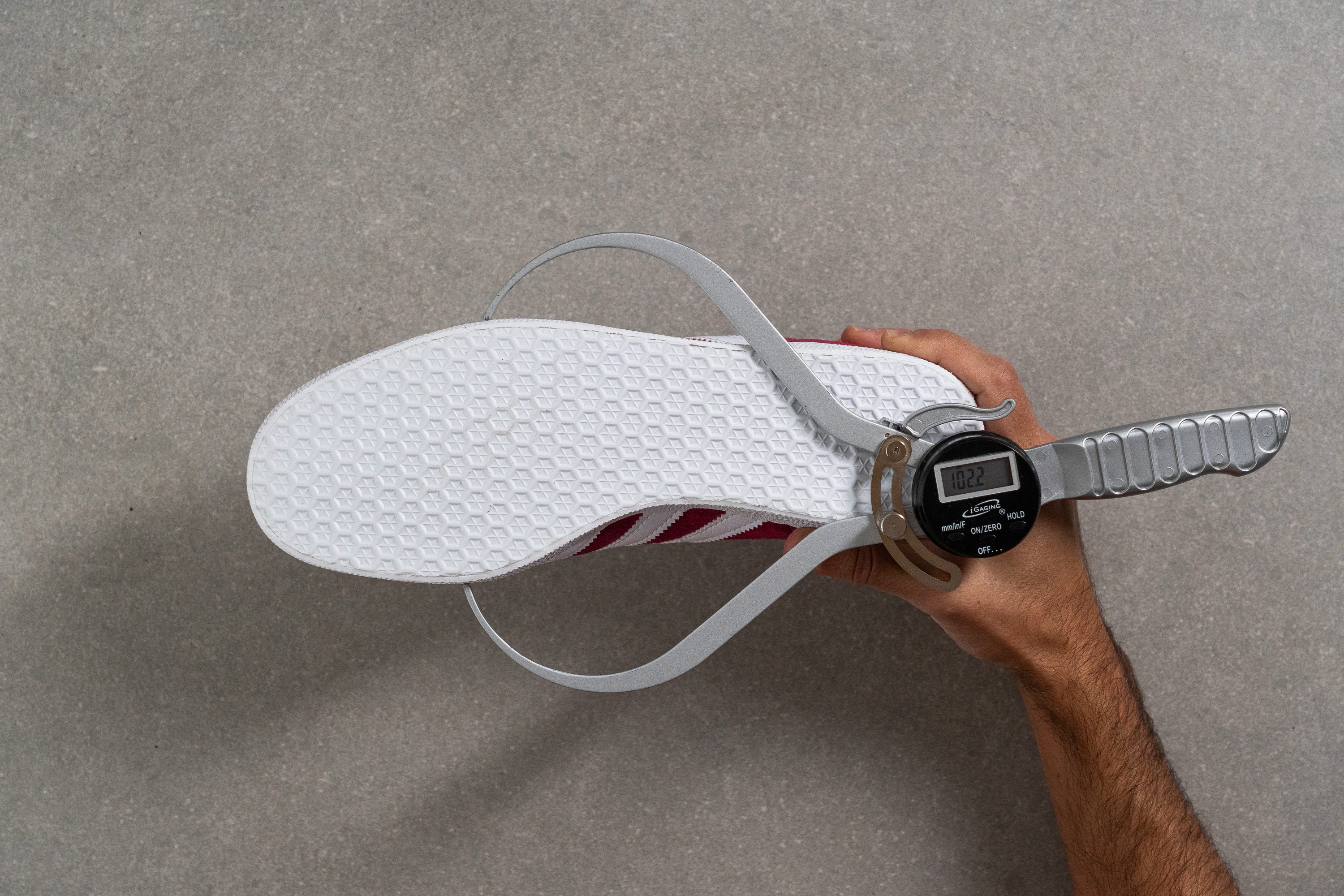
| Gazelle | 102.2 mm |
| Average | 108.9 mm |
Midsole width - heel
The heel of the Gazelle's platform shows 72.0 mm in the widest part. This is even narrower than the Samba (75.4 mm) and, consequently, narrower than the average.
If you are coming from a wider platform, like the New Balance 574 for example (114.3/80.2 mm), it is likely to feel odd at first.
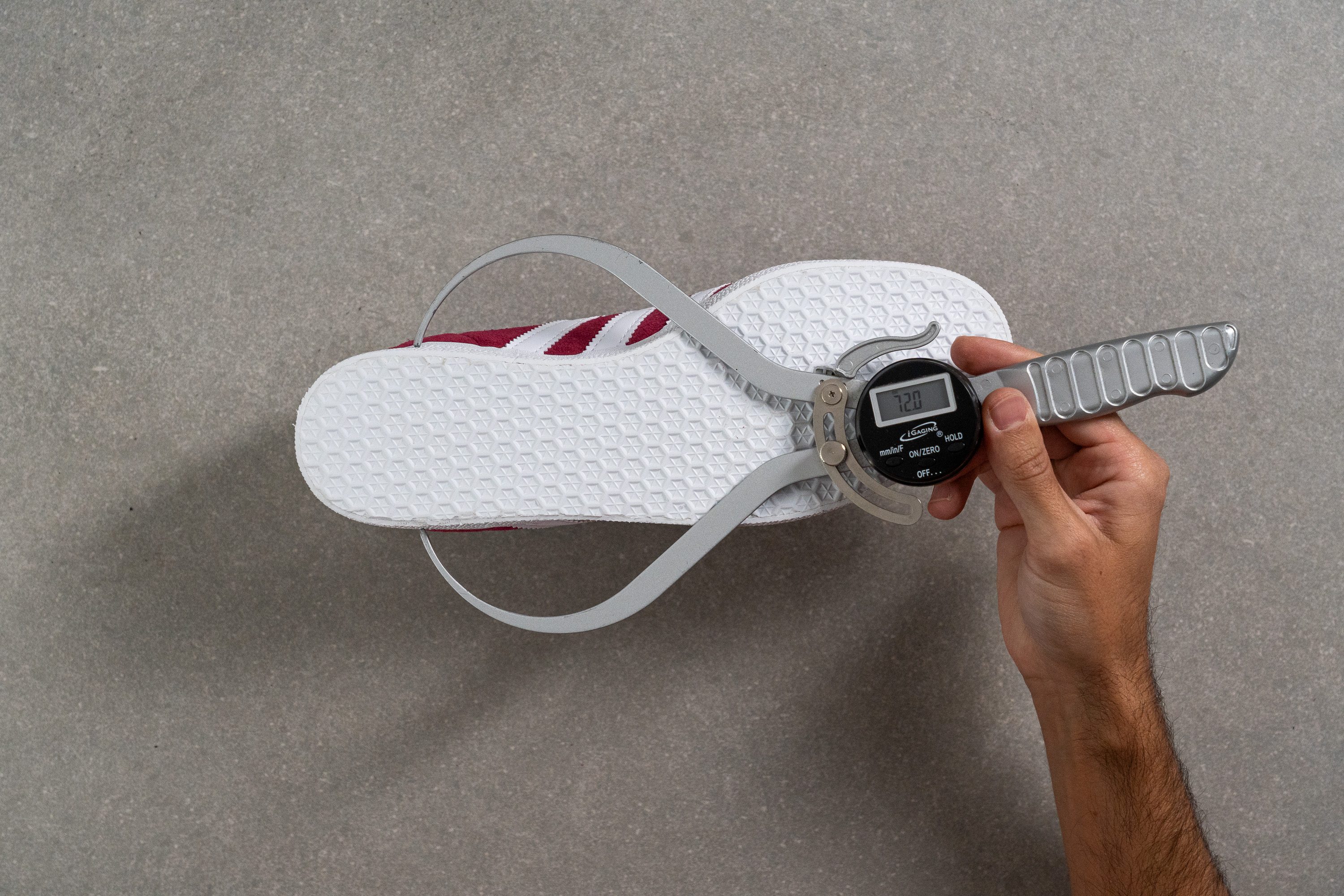
| Gazelle | 72.0 mm |
| Average | 84.0 mm |
Durability
Leather/Suede quality
According to Adidas, Gazelle comes with a suede upper and synthetic lining.
Equipped with a butane torch, we burned the shoe's upper materials for a few seconds to check their genuineness. Next, we tested the burnt parts with a scratch awl.
In the end, we found that the suede is real whereas the white overlay and the inner lining are indeed fake/synthetic.
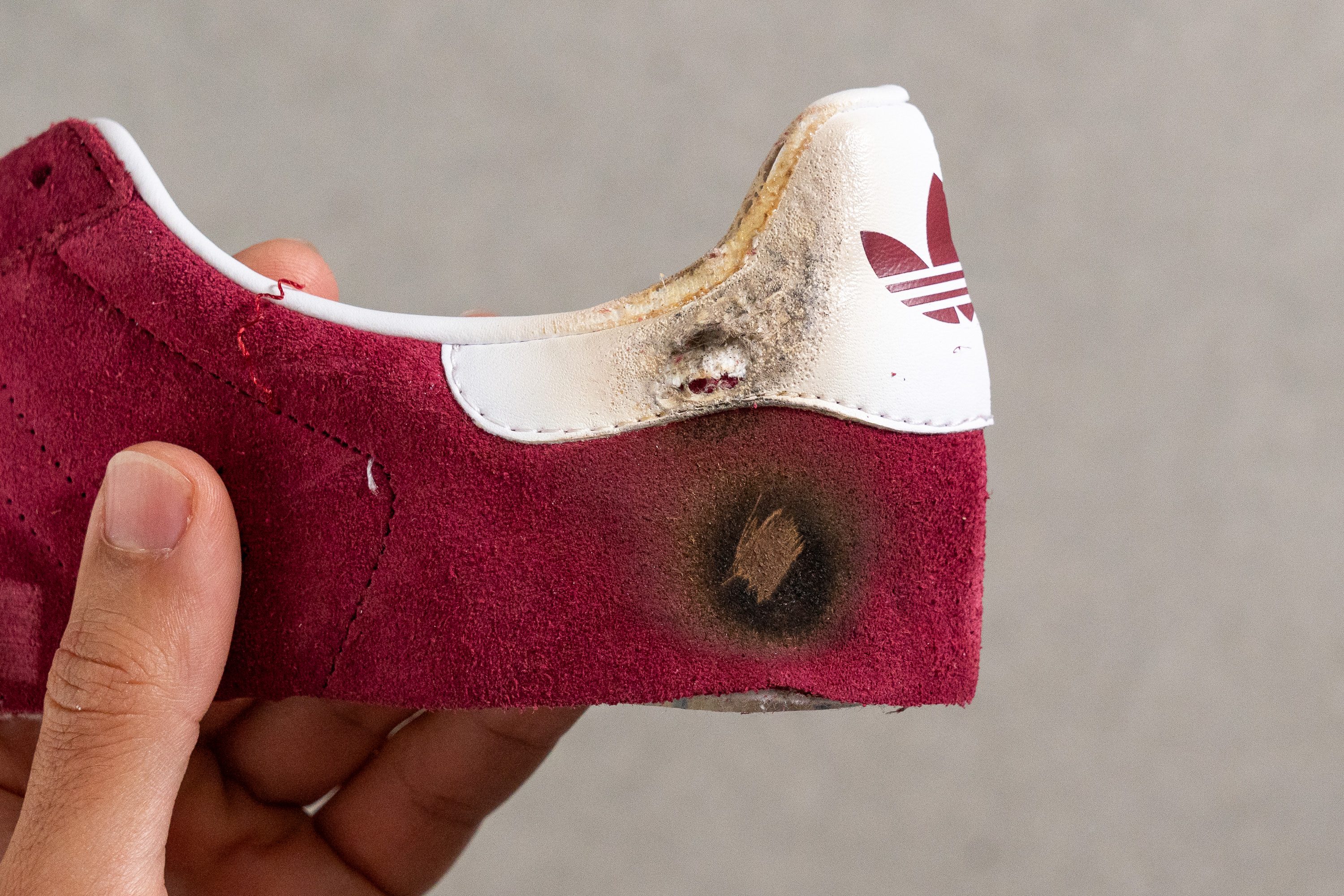
| Gazelle | Real suede |
Toebox durability
A sneaker with real suede in the upper is a wise choice if you want truly long-lasting footwear. Let our Dremel test reassure you of the Gazelle's incredible durability.
Raising the speed to the unforgiving 10K RPM, we held the tool against the shoe's toebox for a whole 12 seconds. And the result was truly stunning.
Seeing just a little dimple on the upper, we were amazed at the wear resistance! On a 1-5 scale, we rated the shoe's toebox durability with the highest score of 5.
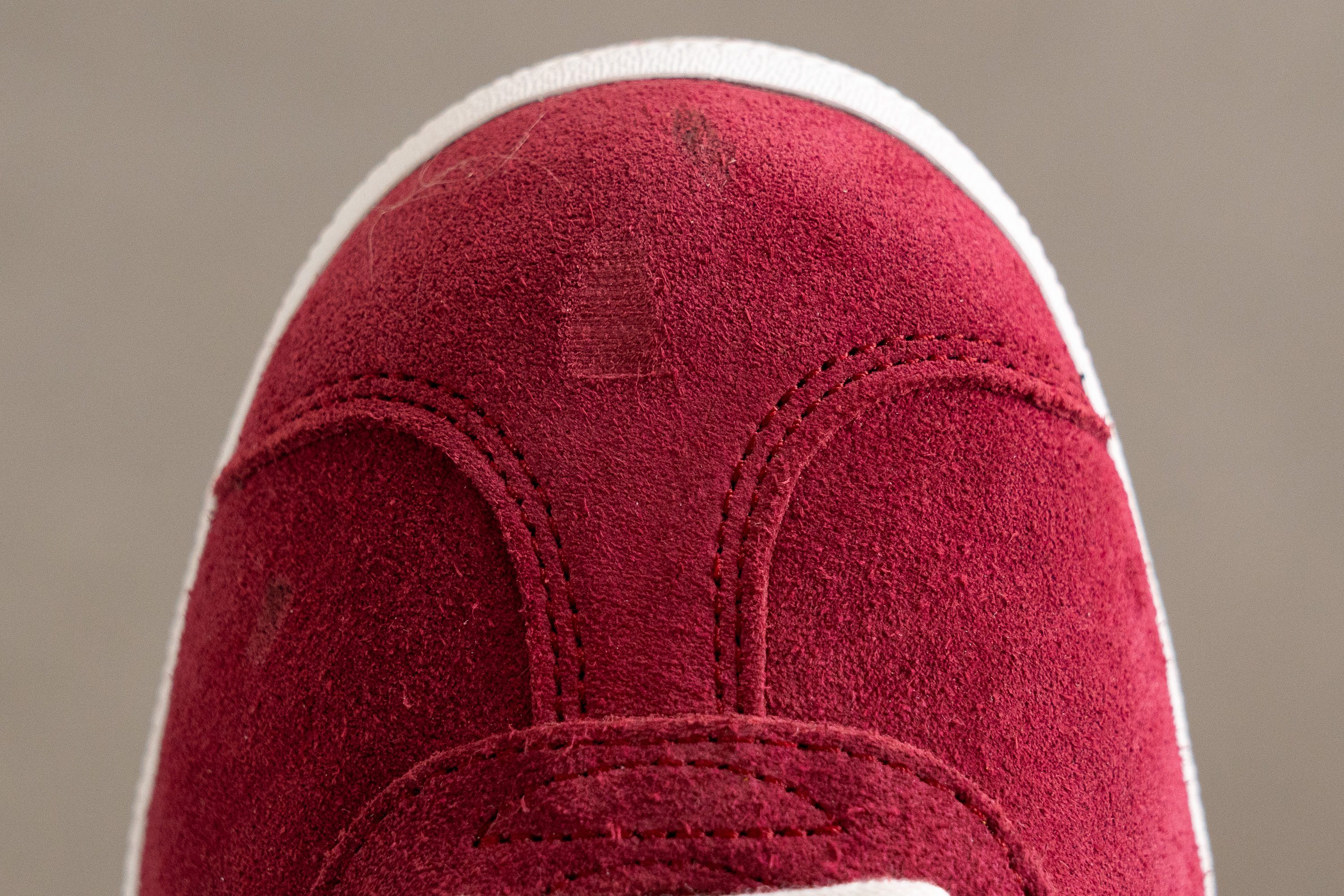
| Gazelle | 5 |
| Average | 3.7 |
Heel padding durability
The inner lining is usually a pretty delicate part of a shoe's upper. But not in the Adidas Gazelle!
Even though it's just a thin synthetic layer, it managed to stand against the Dremel much better than the average.
After 4 seconds of drilling, the tool only scratched the topmost layer without ruining the shoe's integrity. For that reason, we rated the heel padding durability with a high score of 4 out of 5.
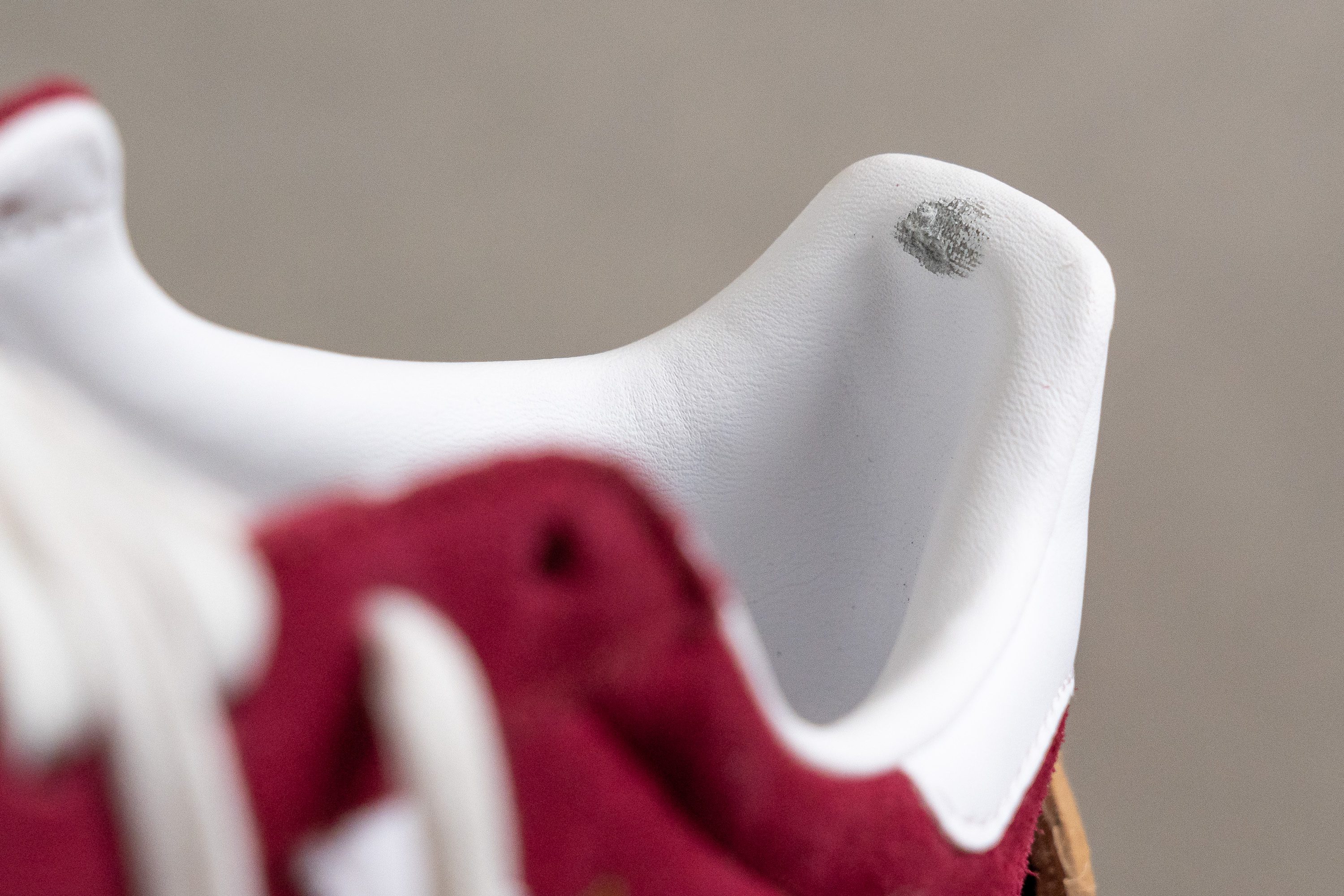
| Gazelle | 4 |
| Average | 3.2 |
Outsole hardness
Seeing how strong the Gazelle's upper is, we couldn't wait to see if the outsole lives up to that standard too.
First, we checked how hard the bottom rubber is. With a durometer measurement of 83.9 HC, it is nearly the same as the average. Normally, there is a correlation between the hardness of rubber and its longevity.
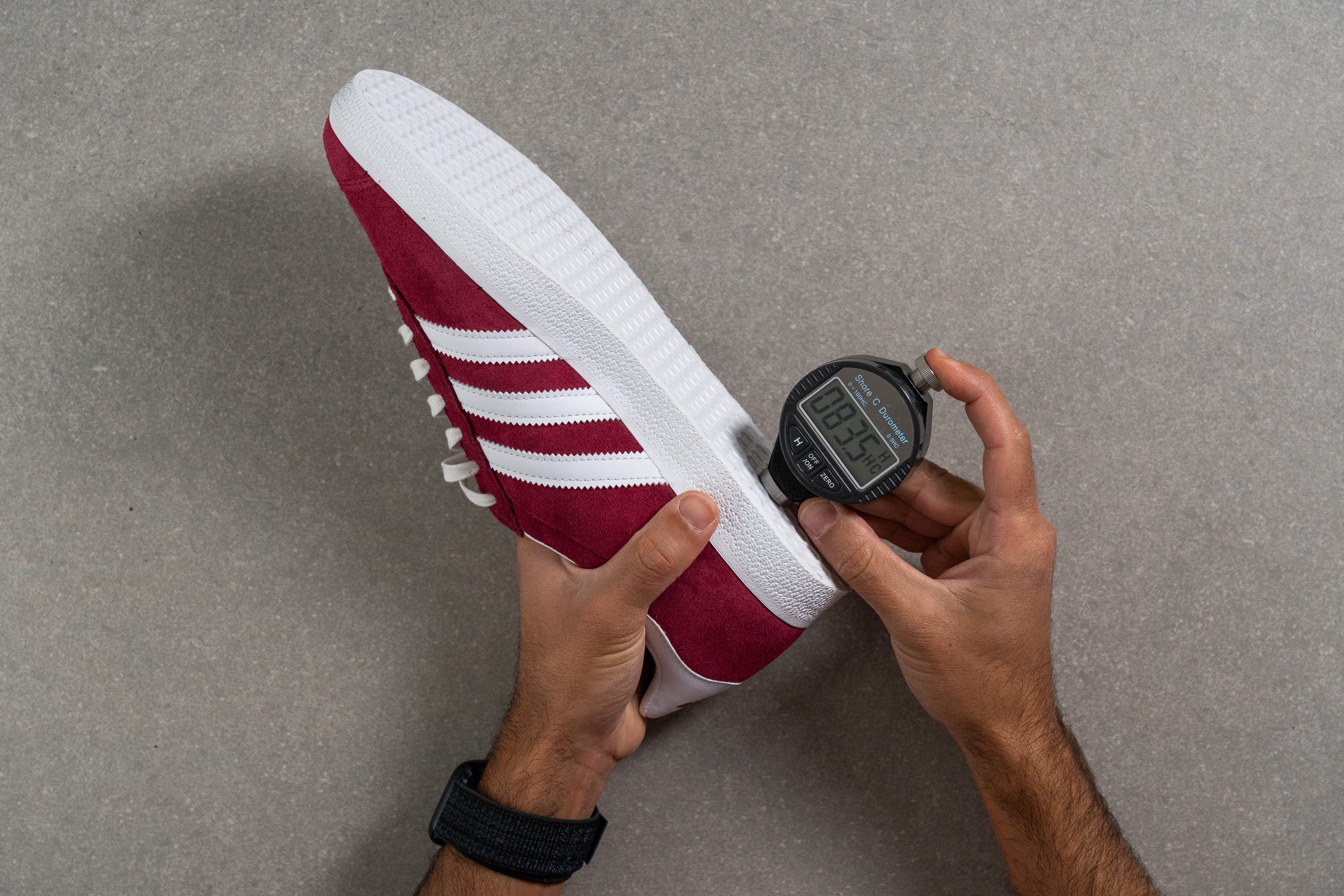
| Gazelle | 83.9 HC |
| Average | 85.7 HC |
Outsole durability
Now it was time to apply our trusty Dremel to the outsole rubber as well. The 10K RPM speed is relentless but so is the Gazelle.
After the long 22-second drilling session was over, we saw that the rubber did not give in that easily!
With the help of a tread gauge, we measured the depth of the damage at 1.2 mm. That is right about the average of our lab-tested sneakers.
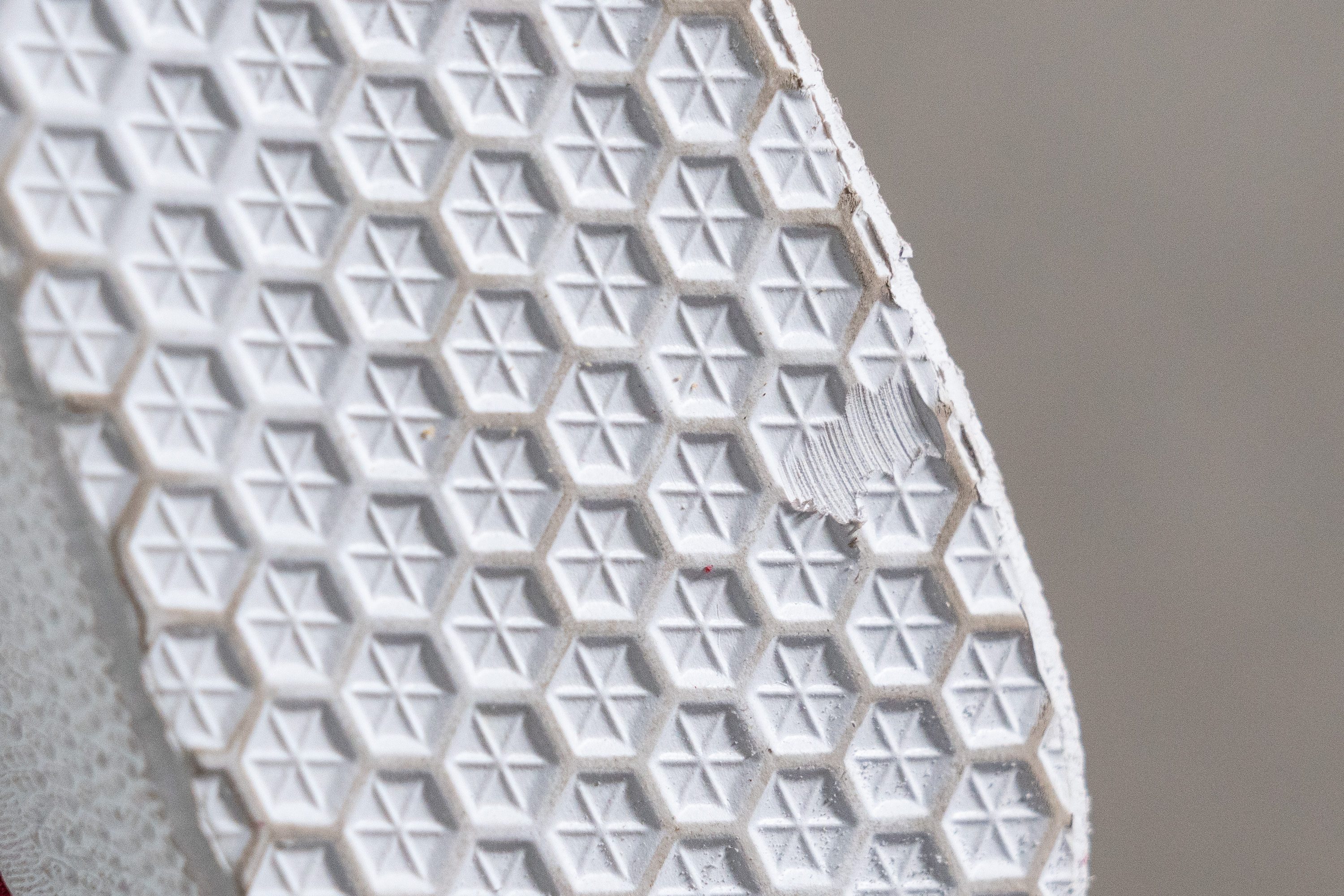
| Gazelle | 1.2 mm |
| Average | 1.1 mm |
Outsole thickness
Despite the fact that the shoe's entire platform is made of rubber, we only considered the thickness of the bottom-most layer (below the vertical pillars). That's because when that one is gone, the whole shoe becomes pretty much unwearable.
Our caliper returned 3.4 mm which is pretty thin for a sneaker. That certainly helps to keep the weight of the shoe down but makes us a little concerned about the long-term outsole durability.
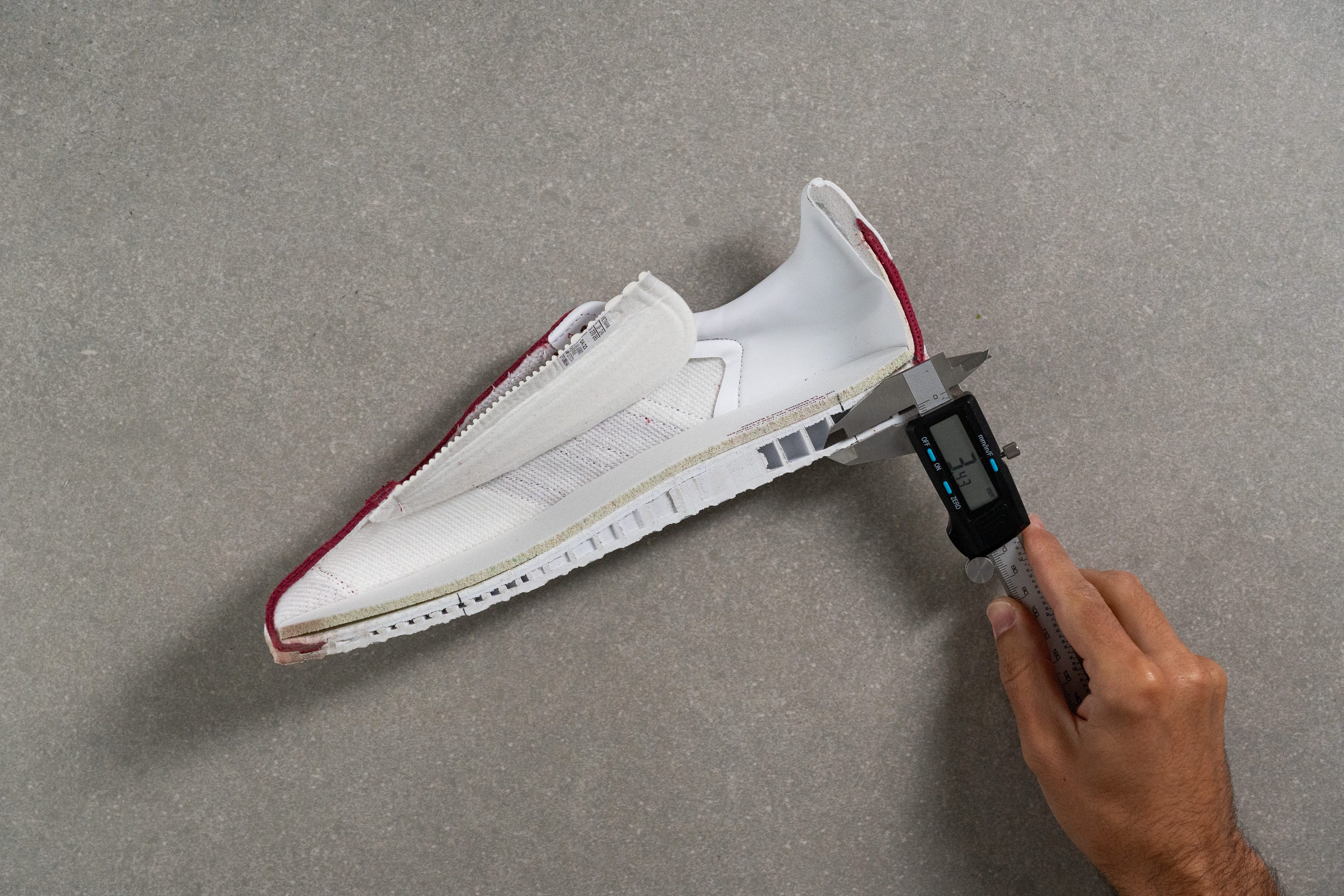
| Gazelle | 3.4 mm |
| Average | 5.3 mm |
Misc
Insole thickness
Some underfoot padding is provided by the shoe's insole to buffer the foot from the rubber sole. But our caliper shows that it's pretty minimal too - only 4.3 mm thick.
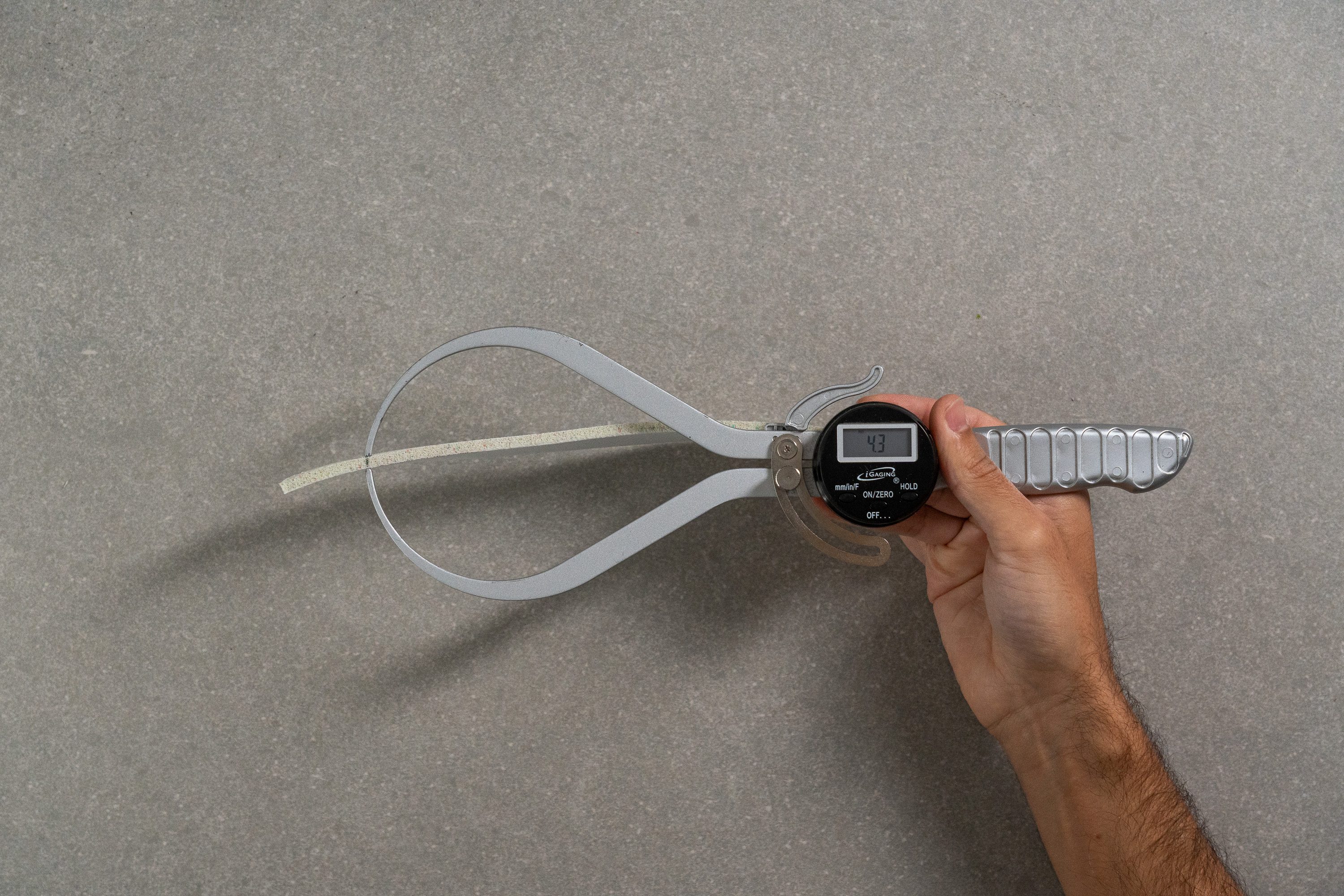
| Gazelle | 4.3 mm |
| Average | 5.1 mm |
Removable insole
You can customize the in-shoe experience by swapping the insole. It is not attached to the bottom of the shoe and can be replaced easily.
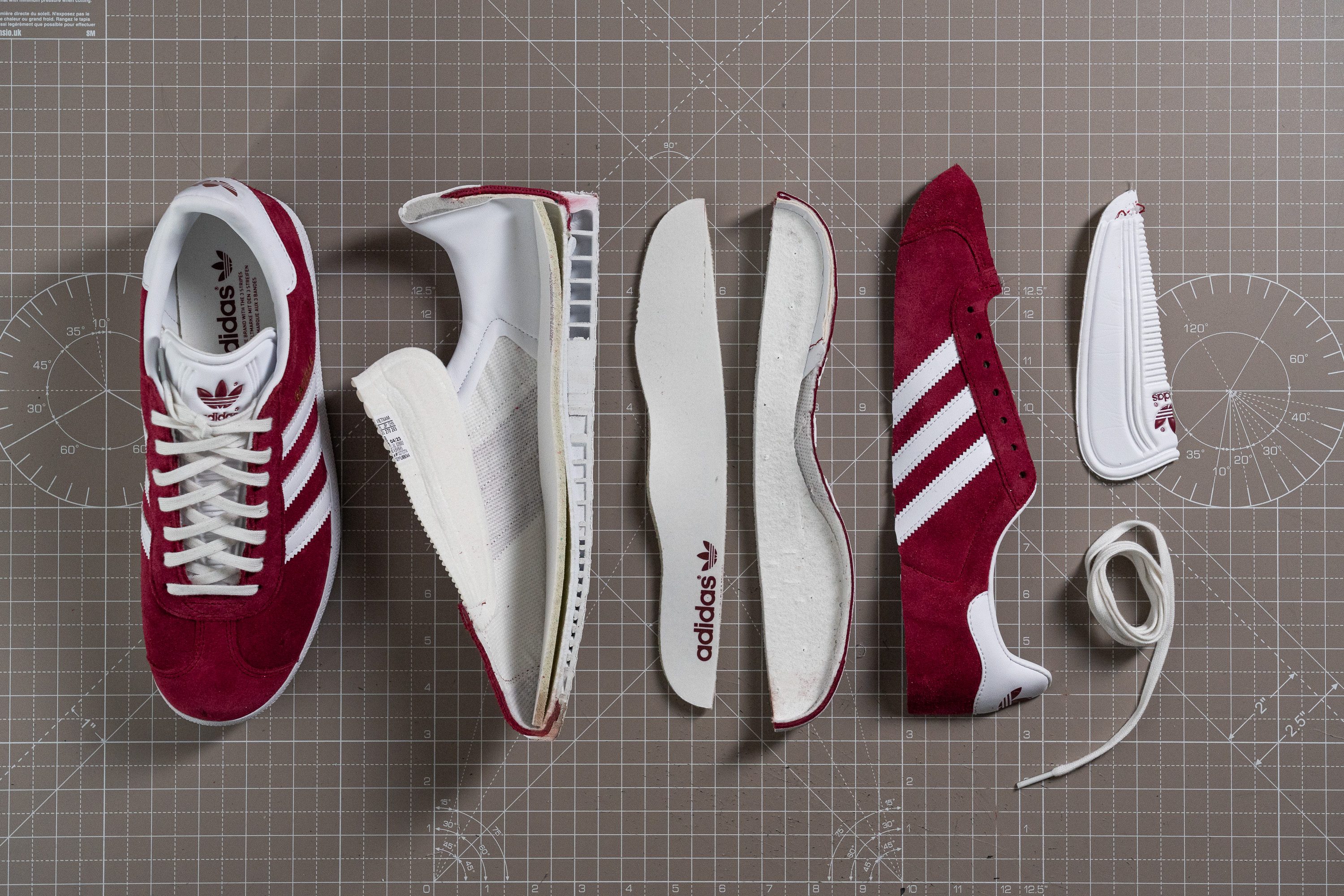
| Gazelle | Yes |
Reflective elements
The Adidas Gazelle has no reflective elements.
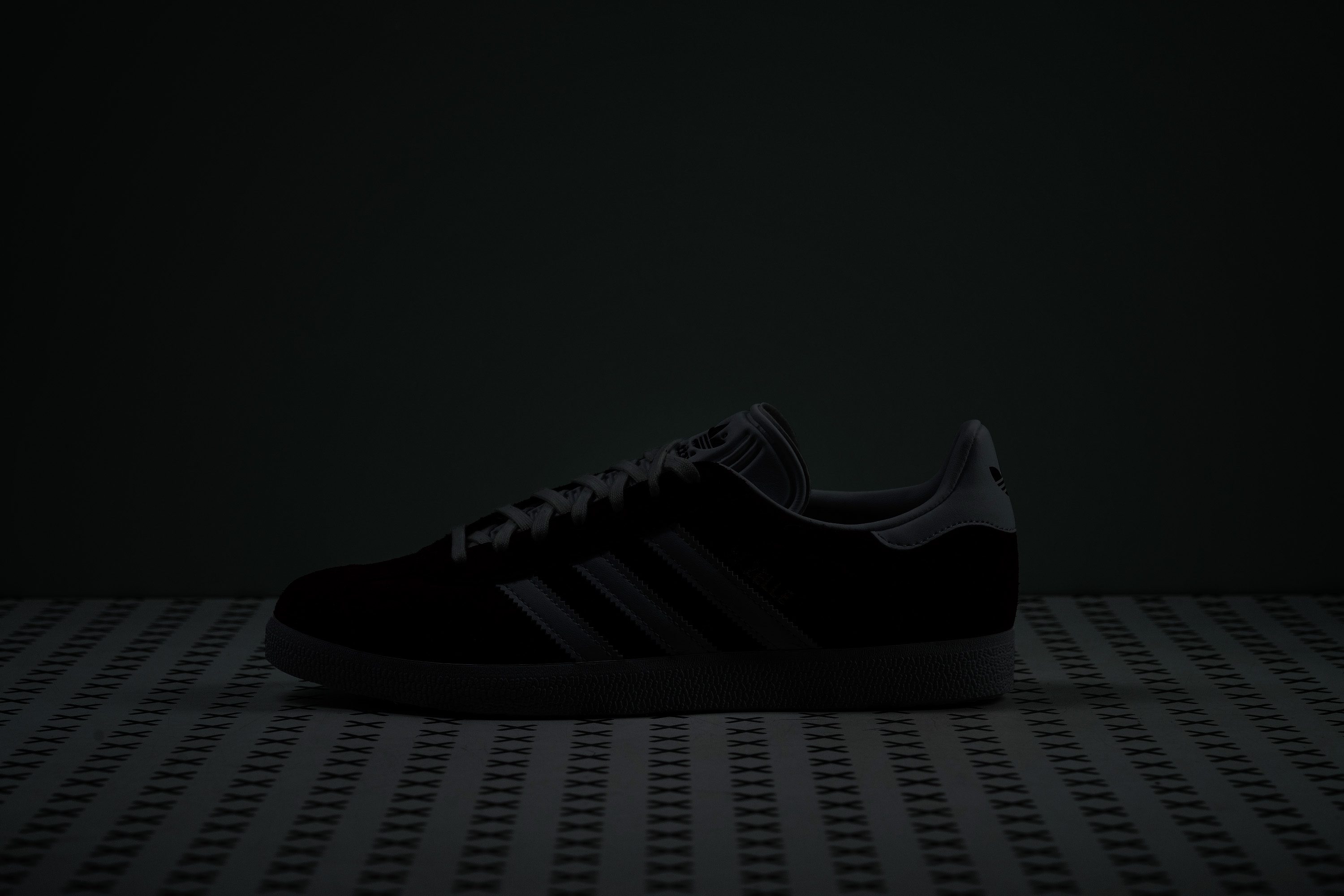
| Gazelle | No |
Tongue padding
Measuring the tongue with a caliper, we found that it is pretty thin at only 2.8 mm.
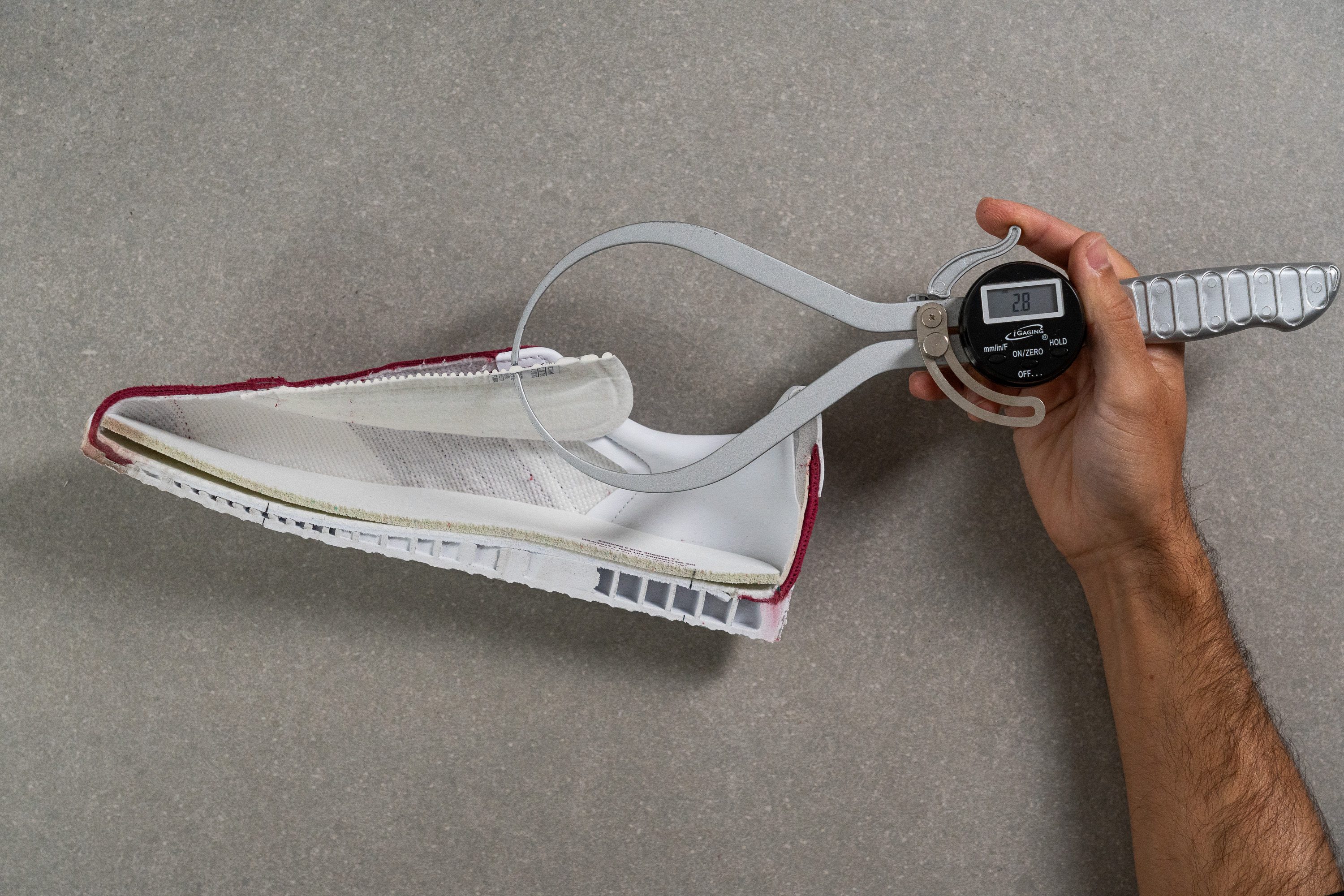
But this wouldn't be so much of a problem if it wasn't for its very rough, almost plastic-like, nature that kept cutting into our ankles mercilessly. Wearing taller socks may not be such a bad idea, at least the first few times.
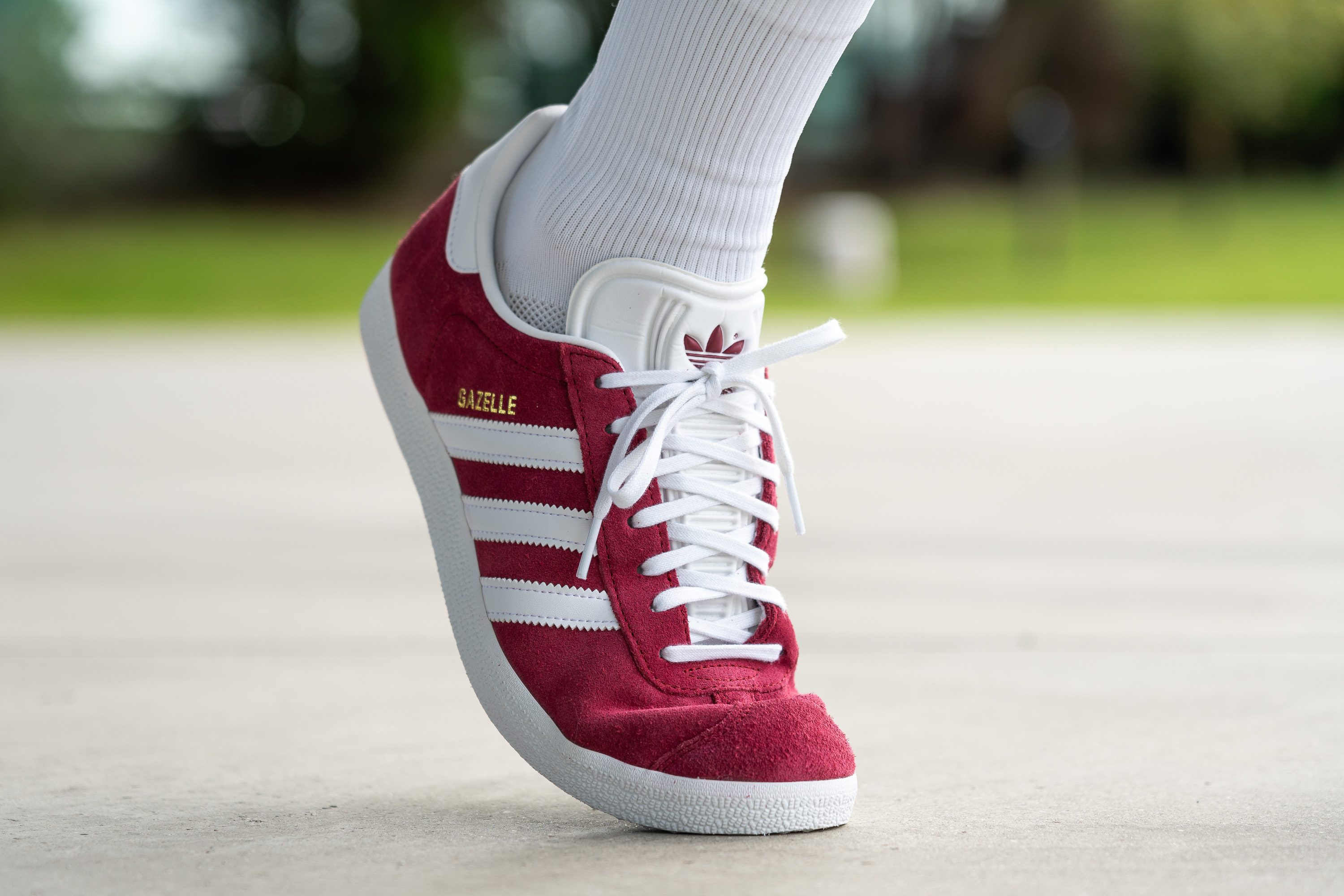
But to our great regret, this was not the only problem with the shoe's tongue. Another major mood-killer is the squeaky sound. It is produced when the rubbery material on the tongue comes in touch with the synthetic lining inside the shoe.
There are a couple of tricks that can help the situation though:
- applying some Vaseline to the lining where it meets the tongue
- sewing a small piece of soft fabric inside the shoe, near the topmost eyelets
| Gazelle | 2.8 mm |
| Average | 9.6 mm |
Tongue: gusset type
The Gazelle's tongue has no gussets on the sides. But we didn't really find them necessary as there was no shifting or bunching.
But, unfortunately, the shoe's tongue can be a real deal-breaker for the Gazelle for other reasons (see the section below).
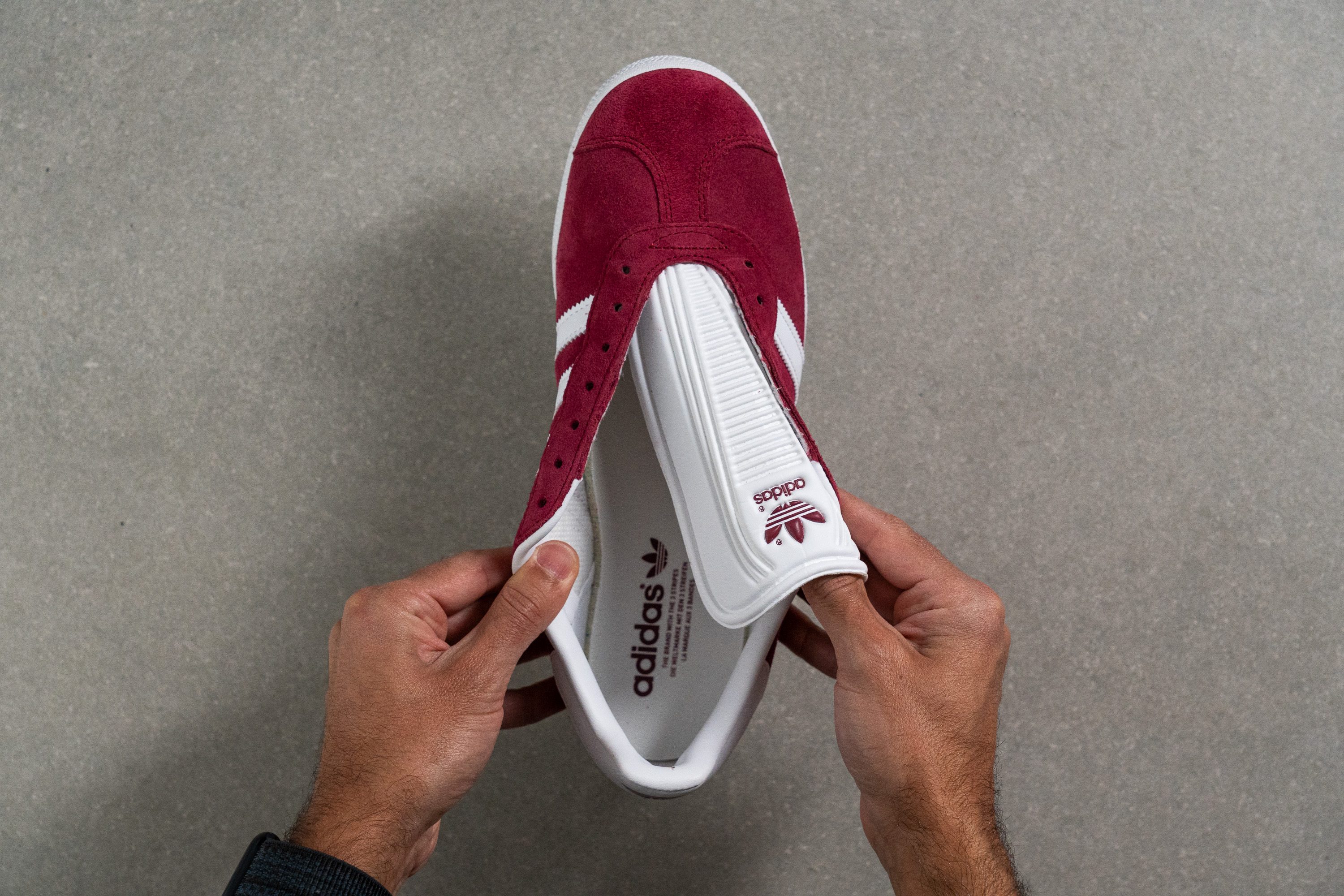
| Gazelle | None |
Heel tab
No heel tabs here but the collar extends up high making it easier to grab when getting the shoe on.
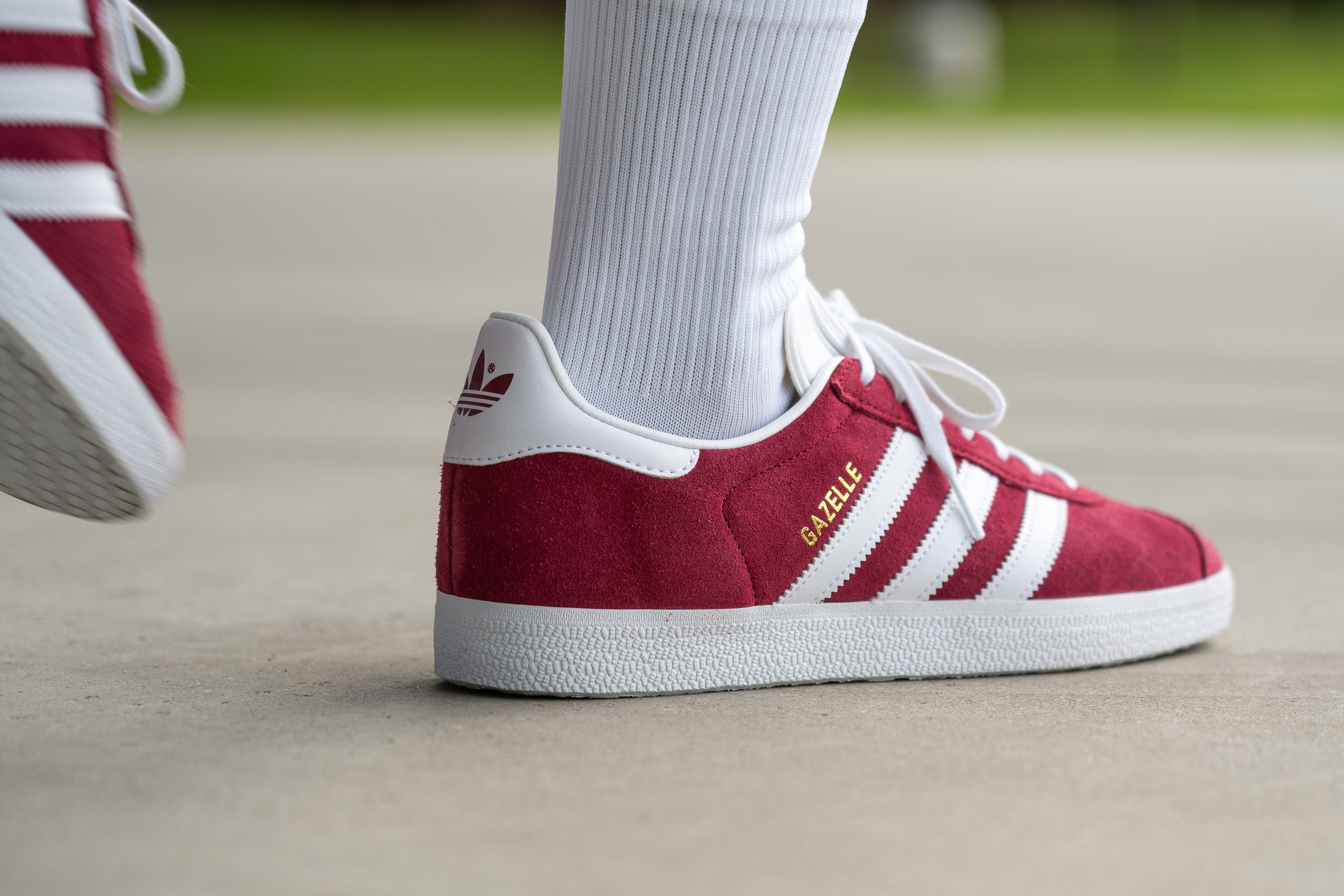
| Gazelle | None |
Style
In 1966, the Adidas Gazelle was first introduced as a performance training shoe. It was the first shoe from Adidas to have a suede upper since, during that time, leather was more commonly used for shoes.
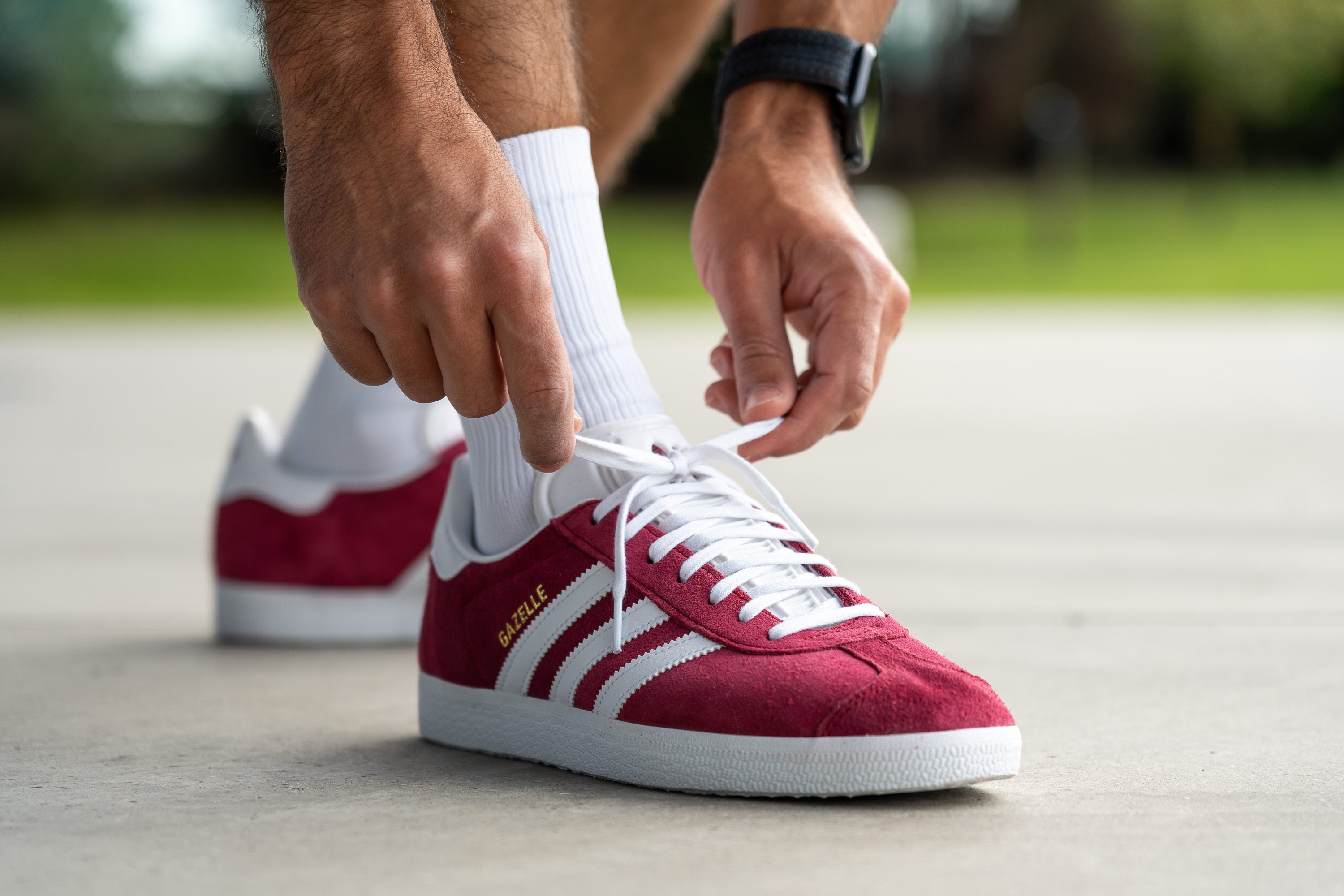
We love the classic and adaptable look of the Gazelle. This ageless Adidas silhouette manages to mix sporty vibes with a chic and sophisticated look. As a result, we get a clean and straightforward style that goes well with a variety of our outfit choices, from street style to a semi-formal look.
Because of its extreme popularity, different variations of the Adidas Gazelle sneakers have surfaced throughout time, allowing people to have a lot of choices that would suit their taste when grabbing a pair of these classic sneakers.

